WORLD BANK Publications
FALL 2023 Publications
Access to World Bank Publications
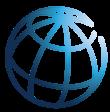


To make our content accessible to as many readers as possible, most publications are available for free online. Read, share, rate, and download at:
Ordering World Bank Publications
United States customers, order on Amazon.com, where all of our current and backlist titles are available. International customers, please refer to the list of local distributors on the inside back cover.
Connect With Us



II www.worldbank.org/publications • books@worldbank.org WORLD BANK PUBLICATIONS TABLE OF CONTENTS GOOGLE BOOKS books.google.com
WORLD BANK PUBLICATIONS worldbank.org/publications
scribd.com/worldbankpublications OPEN KNOWLEDGE REPOSITORY openknowledge.worldbank.org ISSUU issuu.com/world.bank.publications
SCRIBD
LIKE
facebook.com/worldbankpublications FOLLOW US ON TWITTER twitter.com/WBPubs SUBSCRIBE TO PUBLICATIONS ANNOUNCEMENTS bit.ly/WBPubNewsletter SUBSCRIBE TO YOUTUBE CHANNEL bit.ly/WBPubYouTube Flagship Titles ............................................. 1 Featured Titles .......................................... 13 Africa 21 Middle East and North Africa ..................... 22 East Asia and Pacific · South Asia .............. 23 International Development In Focus ........... 24 International Development In Practice ........ 25 Bestsellers 26 Index 28 World Bank Publications Distributors .......... III
US ON FACEBOOK
WORLD DEVELOPMENT REPORT 2023
Migrants, Refugees, and Societies
By the World Bank
Migration is a development challenge. About 184 million people—2.3 percent of the world's population—live outside of their country of nationality. Almost half of them are in low- and middle-income countries. But what lies ahead?
As the world struggles to cope with global economic imbalances, diverging demographic trends, and climate change, migration will become a necessity in the decades to come for countries at all levels of income. If managed well, migration can be a force for prosperity and can help achieve the United Nations’ Sustainable Development Goals.
World Development Report 2023 proposes an innovative approach to maximize the development impacts of cross-border movements on both destination and origin countries and on migrants and refugees themselves. The framework it offers, drawn from labor economics and international law, rests on a “Match and Motive Matrix” that focuses on two factors: how closely migrants’ skills and attributes match the needs of destination countries and what motives underlie their movements. This approach enables policy makers to distinguish between different types of movements and to design migration policies for each. International cooperation will be critical to the effective management of migration.
WORLD DEVELOPMENT REPORT
June 2023. 344 pages.
Stock no. C211941
(ISBN: 978-1-4648-1941-4). US$49.50
ALSO AVAILABLE IN HARDBACK
WORLD DEVELOPMENT REPORT 2023
Migrants, Refugees, and Societies
July 2023. 344 pages. Stock no. C211964 (ISBN: 9781464819643). US$66.00

1 phone +1 (703) 661 1580 • in the U.S. phone +1 (800) 645 7247 • fax +1 (703) 661 1501 WORLD BANK PUBLICATIONS FLAGSHIP TITLES
A World Bank Group Flaship Report 2023 WORLD DEVELOPMENT REPORT
GLOBAL ECONOMIC PROSPECTS, JUNE 2023
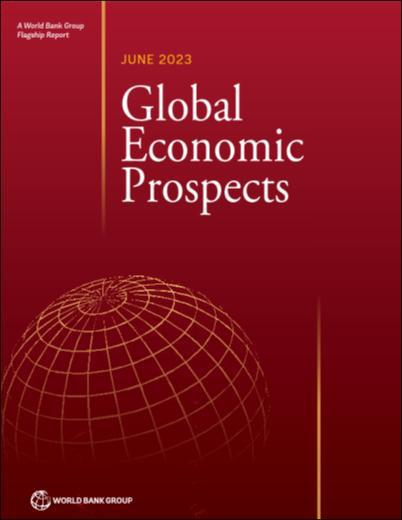 By the World Bank
By the World Bank
Global growth is projected to slow significantly in the second half of this year, with weakness continuing in 2024. Inflation pressures persist, and tight monetary policy is expected to weigh substantially on activity. The possibility of more widespread bank turmoil and tighter monetary policy could result in even weaker global growth. Rising borrowing costs in advanced economies could lead to financial dislocations in the more vulnerable emerging market and developing economies (EMDEs). In low-income countries, in particular, fiscal positions are increasingly precarious.
Comprehensive policy action is needed at the global and national levels to foster macroeconomic and financial stability. Among many EMDEs, and especially in low-income countries, bolstering fiscal sustainability will require generating higher revenues, making spending more efficient, and improving debt management practices. Continued international cooperation is also necessary to tackle climate change, support populations affected by crises and hunger, and provide debt relief where needed. In the longer term, reversing a projected decline in EMDE potential growth will require reforms to bolster physical and human capital and labor-supply growth
July 2023. 194 pages.
Stock no. C211951
(ISBN: 978-1-4648-1951-3). US$49.50
COMING SOON
GLOBAL ECONOMIC PROSPECTS, JANUARY 2024
January 2024. 184 pages. Stock no. C212017 (ISBN: 9781464820175). US$49.50
2 www.worldbank.org/publications • books@worldbank.org WORLD BANK PUBLICATIONS FLAGSHIP TITLES
JOBS FOR DEVELOPMENT
Applying a Jobs Lens to Structural Change and Economic Growth
By Andreas Eberhard-Ruiz, Dino Merotto, Federica Saliola, and Ian Walker
Development reaches people through jobs. Economic growth transforms societies. But it is through increases in labor income from jobs that people reap these gains. Yet the limited availability of quality jobs remains the most pressing economic problem in developing countries.
Jobs for Development: Applying a Jobs Lens to Structural Change and Economic Growth applies a jobs-focused approach to development, which puts the creation of more productive and better-paying jobs at the center of country growth strategies. To support the approach, it presents an empirically grounded conceptual and operational framework built on new global, regional, country, and subnational data from over three decades that reveal how patterns of jobs and production vary across different stages of the development process. It aims to help practitioners prioritize country-specific policy areas around three pillars: production, people, and places.

The report’s main aim is operational. It makes three contributions to the debate on how jobs can be integrated in development projects and programs, by: 1) helping focus country diagnostics on the creation of more productive and better-paying jobs with economic growth; 2) providing new knowledge from global and in-country patterns of employment as countries develop; and 3) offering practitioners guidance on how to improve the design and monitoring of programs and projects to maximize their impact on jobs.
December 2023. 300 pages. Stock no. C212011 (ISBN: 978-1-4648-2011-3). US$43.95
YOU MAY ALSO BE INTERESTED IN COLLAPSE AND RECOVERY
How the COVID-19 Pandemic Eroded Human Capital and What to Do about It
March 2023. 186 pages. Stock no. C211901 (ISBN: 9781464819018). US$43.95
3 phone +1 (703) 661 1580 • in the U.S. phone +1 (800) 645 7247 • fax +1 (703) 661 1501 WORLD BANK PUBLICATIONS
FLAGSHIP TITLES
DETOX DEVELOPMENT
Repurposing Environmentally Harmful Subsidies
By Richard Damania, Esteban Balseca, Charlotte de Fontaubert, Joshua Gill, Kichan Kim, Jun Rentschler, Jason Russ, and Esha Zaveri
Clean air, land, and oceans are critical for human health and nutrition and underpin much of the world’s economy. Yet they suffer from degradation, poor management, and overuse due to government subsidies.
June 2023. 302 pages.
Stock no. C211916 (ISBN: 978-1-4648-1916-2). US$49.50
Detox Development: Repurposing Environmentally Harmful Subsidies examines the impact of subsidies on these foundational natural assets. Explicit and implicit subsidies—estimated to exceed US$7 trillion per year— not only promote inefficiencies but also cause much environmental harm. Poor air quality is responsible for approximately 1 in 5 deaths globally. And as the new analyses in this report show, a significant number of these deaths can be attributed to fossil fuel subsidies. Agriculture is the largest user of land worldwide, feeding the world and employing 1 billion people, including 78 percent of the world’s poor. But it is subsidized in ways that promote inefficiency, inequity, and unsustainability. Subsidies are shown to drive the deterioration of water quality and increase water scarcity by incentivizing overextraction. In addition, they are responsible for 14 percent of annual deforestation, incentivizing the production of crops that are cultivated near forests. These subsidies are also implicated in the spread of zoonotic and vector-borne diseases, especially malaria. Finally, oceans support the world’s fisheries and supply about 3 billion people with almost 20 percent of their protein intake from animals. Yet they are in a collective state of crisis, with more than 34 percent of fisheries overfished, exacerbated by open-access regimes and capacity-increasing subsidies.
Although the literature on subsidies is large, this report fills significant knowledge gaps using new data and methods. In doing so, it enhances understanding of the scale and impact of subsidies and offers solutions to reform or repurpose them in efficient and equitable ways. The aim is to enhance understanding of the magnitude, consequences, and drivers of policy successes and failures in order to render reforms more achievable.
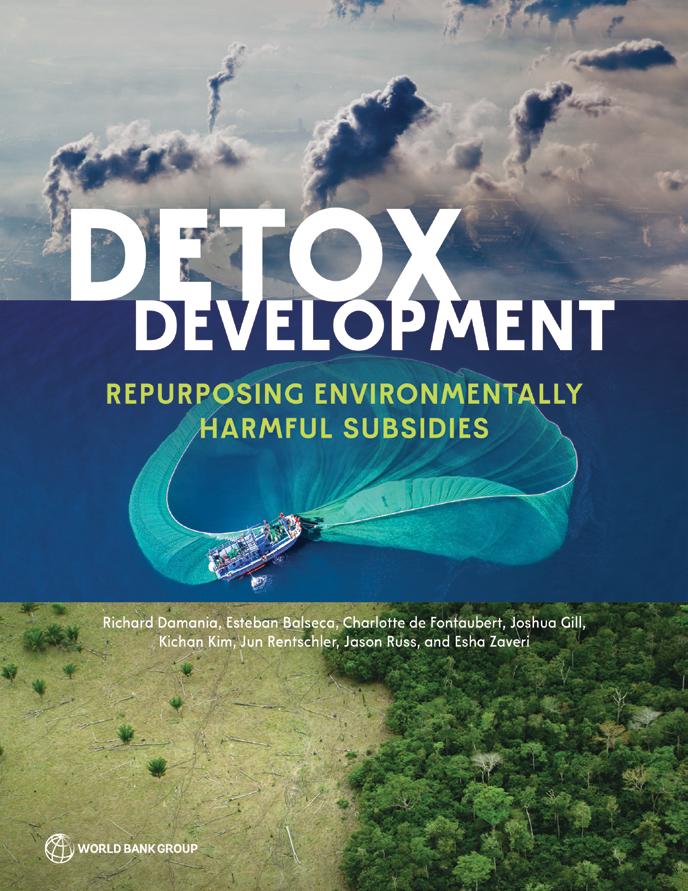
4 www.worldbank.org/publications • books@worldbank.org WORLD BANK PUBLICATIONS FLAGSHIP TITLES
THRIVING
Making Cities Green, Resilient, and Inclusive in a Changing Climate
Edited by Megha Mukim and Mark Roberts
Between 1970 and 2021, the number of people living in cities increased from 1.19 billion to 4.46 billion, while the Earth’s surface temperature climbed by 1.19 degrees Celsius above its preindustrial levels. Because of the prosperity they helped generate, cities have been a major cause of this climate change. However, it is also in cities that many of the solutions to the climate crisis—in terms of both adaptation and mitigation—will be found, not least because by 2050, almost 70 percent of the world's population will call cities home. As such, cities are the key to arguably the greatest public policy challenge of our times.
To take stock of how green, how resilient, and how inclusive cities globally are today, Thriving: Making Cities Green, Resilient, and Inclusive in a Changing Climate defines a global typology of more than 10,000 cities. It finds that there is wide variation in how green, resilient, and inclusive cities are around the world. It asks how climate change impacts cities and, conversely, how cities affect climate. Vicious cycles in development could occur as cities become more vulnerable to extreme events and the challenges compound and cascade. Finally, this report provides a compass for policy makers on policies that can help cities not only survive but also thrive in the face of the perils of climate change. Policy makers can and must act now to chart a more sustainable trajectory.

May 2023. 350 pages.
Stock no. C211935
(ISBN: 978-1-4648-1935-3). US$49.50
YOU MAY ALSO BE INTERESTED IN PLACE, PRODUCTIVITY, AND PROSPERITY
Revisiting Spatially Targeted Policies for Regional Development
March 2022. 262 pages. Stock no. C211670 (ISBN: 9781464816703). US$48.50
5 phone +1 (703) 661 1580 • in the U.S. phone +1 (800) 645 7247 • fax +1 (703) 661 1501 WORLD BANK PUBLICATIONS FLAGSHIP TITLES
THE ECONOMICS OF ELECTRIC VEHICLES FOR PASSENGER TRANSPORTATION
By Cecilia Briceno-Garmendia, Wenxin Qiao, and Vivien Foster
The Economics of Electric Vehicles for Passenger Transportation provides answers to three critical questions: Why should developing countries pursue e-mobility? When does an accelerated transition to electric vehicles (EVs) make sense for developing countries? How can governments make this transition happen?
A key finding from the research is that there is a strong economic case for EVs in many developing countries. This is news because, despite growing momentum and interest in the sector, 90 percent of EV sales are still concentrated in major markets such as China, Europe, and the United States. According to original models developed by the report’s authors, developing countries can look to electric buses as well as to two- and three-wheel vehicles as entry points to this critical transition.
SUSTAINABLE INFRASTRUCTURE
May 2023. 250 pages.
Stock no. C211948 (ISBN: 978-1-4648-1948-3). US$49.50
Readers will find many examples of countries already benefiting from e-mobility solutions. For example, Brazil, Chile, and India are leaders in electric bus fleets. Their progress, made possible by innovative financing and procurement practices, is improving mobility in cities, reducing local air pollution, and reducing congestion in fast-growing downtowns. Readers will also see examples from Asian and East African countries, which are embarking on battery-swapping schemes to lower up-front costs of ownership for two- and three-wheel vehicles.
Based on the unique modeling, analysis, and benchmarking of results across 20 developing countries—complemented by a compilation of actual organic and diverse experiences of developing countries with electric mobility adoption—this report provides policy guidance on how governments can accelerate EV adoption, and when and where it makes economic sense to adopt electric mobility more quickly. This report is a critical read for anyone interested in the future of transportation and its links with development progress.

6 www.worldbank.org/publications • books@worldbank.org WORLD BANK PUBLICATIONS FLAGSHIP TITLES
PRODUCTIVITY THROUGH A TERRITORIAL LENS
Leveraging Spatial Development for Accelerated Economic Growth in Latin America and the Caribbean
By Elena Ianchovichina
The problem of low economic growth in Latin America has puzzled economists for decades. Numerous explanations have been provided over the years yet few have focused on spatial or geographical factors, in particular the role of mobility frictions, which along with some structural and spatial features of cities in the region weaken urban productivity growth. Using the core concepts of economic geography in a nuanced and deliberative way, Productivity
Through a Territorial Lens: Leveraging Spatial Development for Accelerated Economic Growth in Latin America and the Caribbean adopts a ‘territorial’ lens to uncover the key spatial constraints to specialization, migration, and agglomeration, and hence long-run economic growth.
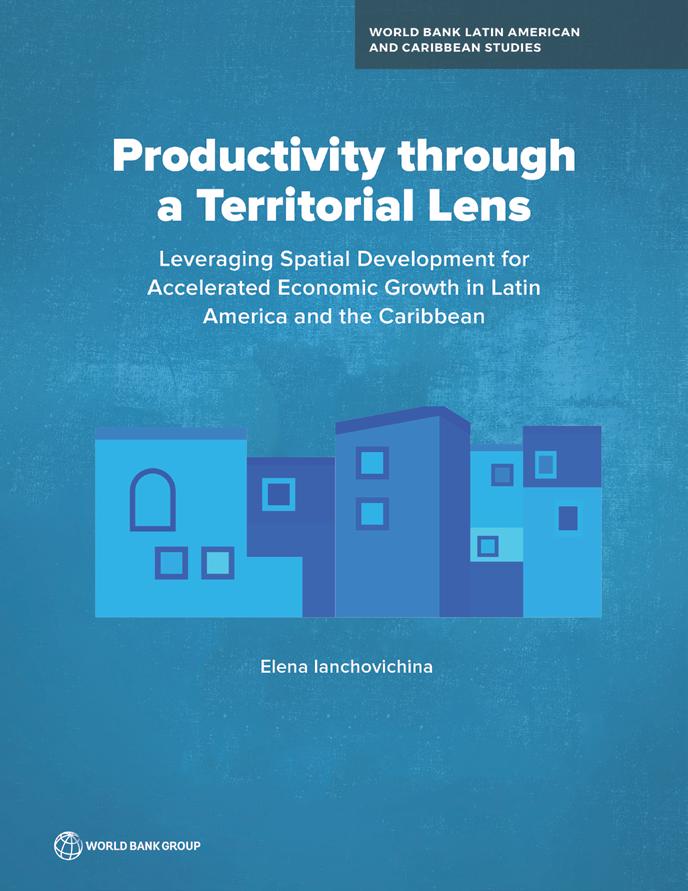
The study first documents the evolution of territorial differences in labor and place productivity within countries in the region between the early 2000s and the late 2010s. It then assesses the size of mobility frictions from migration and transport costs and the extent to which they generate misallocation and constrain national output and welfare growth. Finally, the investigation turns to spatial and structural reasons behind weak agglomeration economies in a region of large and dense cities. It concludes with ideas on how to improve the region’s prospects for accelerated inclusive growth.
November 2023. 140 pages.
Stock no. C211959
(ISBN: 978-1-4648-1959-9). US$43.95
ALSO AVAILABLE IN THIS SERIES
EMPLOYMENT IN CRISIS
The Path to Better Jobs in a Post-COVID-19 Latin America
October 2021. 156 pages. Stock no. C211762 (ISBN: 9781464816727). US$ 43.00
7 phone +1 (703) 661 1580 • in the U.S. phone +1 (800) 645 7247 • fax +1 (703) 661 1501 WORLD BANK PUBLICATIONS
FLAGSHIP TITLES
WORLD BANK LATIN AMERICAN AND CARIBBEAN STUDIES
STRIVING FOR CLEAN AIR
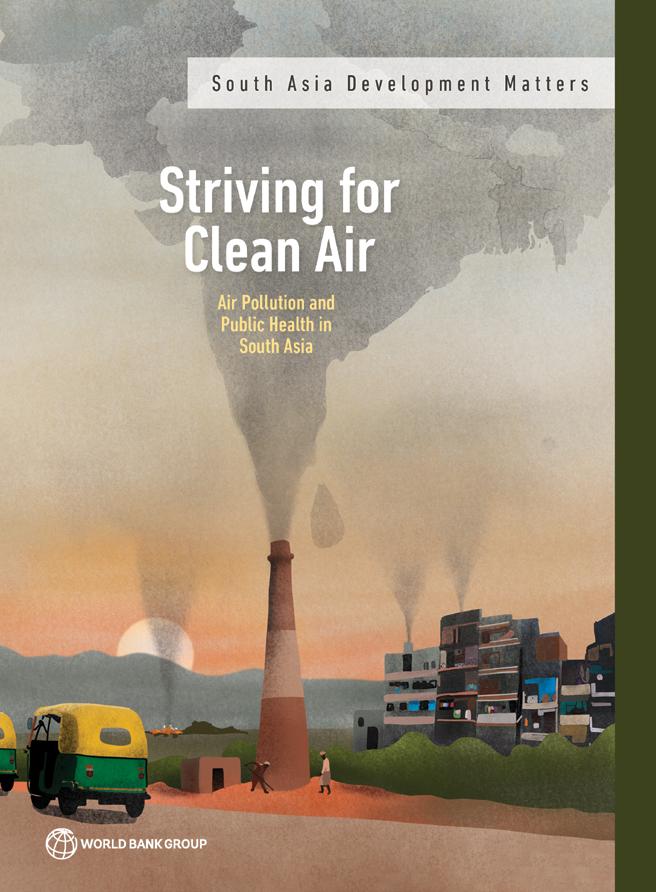
Air Pollution and Public Health in South Asia
By the World Bank
South Asia is home to 9 of the world’s 10 cities with the worst air pollution. Concentrations of fine particulate matter (PM2.5) in some of the region’s most densely populated and poor areas are up to 20 times higher than what the World Health Organization considers healthy (5 micrograms per cubic meter). This pollution causes an estimated 2 million premature deaths in the region each year and results in significant economic costs.
Controlling air pollution is difficult without a better understanding of the activities that cause emissions of particulate matter. Air pollution travels long distances in South Asia and gets trapped in large ‘airsheds’ that are shaped by climatology and geography. Striving for Clean Air: Air Pollution and Public Health in South Asia identifies six major airsheds in the region and analyzes four scenarios for reducing air pollution with varying degrees of policy implementation and cooperation among countries.
SOUTH ASIA DEVELOPMENT MATTERS
June 2023. 114 pages.
Stock no. C211831
(ISBN: 978-1-4648-1831-8). US$49.50
The analysis shows that cooperation between different jurisdictions within an airshed is crucial, and a schematic road map with three phases is proposed. The phases in the road map may overlap when the rate of progress differs, depending on local circumstances. Phase 1 would improve monitoring and institutions; Phase 2 would introduce additional and joint targets for cost-effective abatement; and Phase 3 would mainstream air quality in the economy.
ALSO AVAILABLE IN THIS SERIES
HIDDEN POTENTIAL
Rethinking Informality in South Asia
January 2023. 354 pages. Stock no. C211834 (ISBN: 9781464818349). US$ 43.95
8 www.worldbank.org/publications • books@worldbank.org WORLD BANK PUBLICATIONS FLAGSHIP TITLES
BRIDGING THE BASIC LEARNING GAP
Supporting Teachers in Middle-Income East Asia and the Pacific
By the World Bank
Middle-income countries in the East Asia and the Pacific region were already experiencing serious learning deficits prior to the COVID-19 pandemic. COVID-19 related school disruptions only made things worse. Learning poverty—defined as the percentage of 10-year-olds who cannot read and understand an age-appropriate text—is as high as 90 percent in several countries. Several large Southeast Asian countries consistently perform well below expectations on adolescent learning assessments.
Bridging the Basic Learning Gap: Supporting Teachers in Middle-Income East Asia and the Pacific examines key factors affecting student learning in the region, with an emphasis on the central role of teachers and teaching quality. It also analyzes the role of education technologies, which came into widespread use during the pandemic, and examines the political economy of education reform. The report presents recommendations on how countries can strengthen teaching to improve learning and, in doing so, can enhance productivity, growth, and future development in the region.
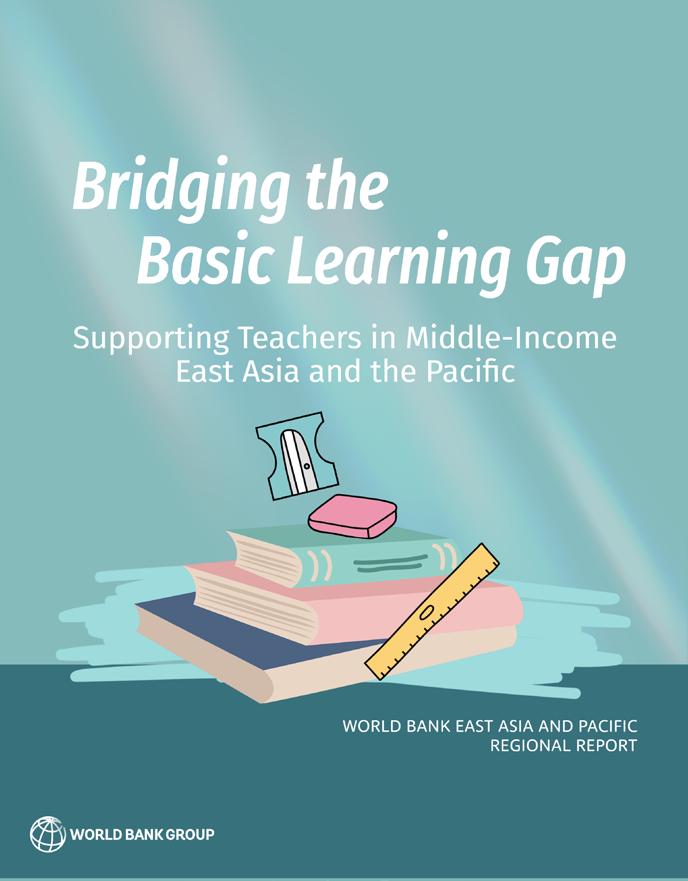
WORLD BANK EAST ASIA AND PACIFIC REGIONAL REPORT
October 2023. 150 pages.
Stock no. C211904
(ISBN: 978-1-4648-1904-9). US$43.95
ALSO AVAILABLE IN THIS SERIES
THE INNOVATION IMPERATIVE FOR DEVELOPING EAST ASIA
May 2021. 220 pages. Stock no. C211606 (ISBN: 9781464816062). US$ 48.50
9 phone +1 (703) 661 1580 • in the U.S. phone +1 (800) 645 7247 • fax +1 (703) 661 1501 WORLD BANK PUBLICATIONS FLAGSHIP TITLES
DIGITAL AFRICA (FRENCH EDITION)
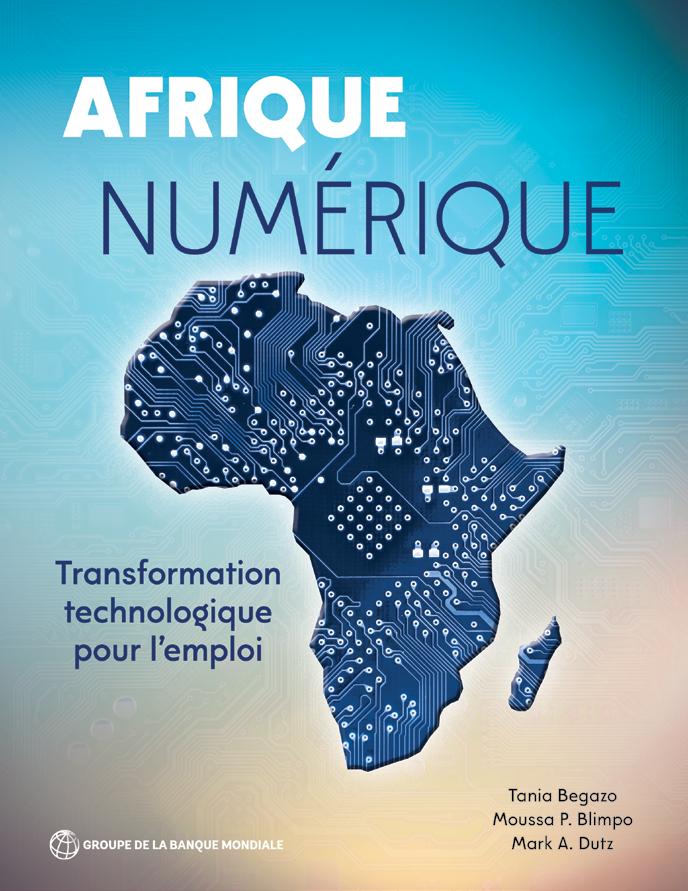
Technological Transformation for Jobs
By Tania Begazo, Moussa P. Blimpo, and Mark A. Dutz
All African countries need better and more jobs for their growing populations. Digital Africa: Technological Transformation for Jobs shows that broader use of productivity-enhancing digital technologies by enterprises and households is imperative to generate such jobs, including for lower-skilled people. At the same time, broader use can support not only countries’ short-term objective of postpandemic economic recovery but also their vision of economic transformation with more inclusive growth.
These outcomes are not automatic, however. Mobile internet availability has increased throughout the continent in recent years, but Africa’s uptake gap is the highest in the world. Areas with at least 3G mobile internet service now cover 84 percent of country populations averaged across Sub-Saharan Africa, but only 22 percent use such services. The average African business lags in the use of smartphones and computers, as well as more sophisticated digital technologies that catalyze further productivity gains.
Two issues explain the usage gap: the affordability of these new technologies and the willingness to use them.
August 2023. 274 pages.
Stock no. C211970 (ISBN: 978-1-4648-1970-4). US$49.50
For those countries already using these technologies, the development payoffs are significant. New empirical studies for this report add to the rapidly growing evidence that mobile internet availability directly raises enterprise productivity, increases jobs, and reduces poverty across Africa.
To realize these and other benefits more widely, Africa’s countries must implement complementary and mutually reinforcing policies to strengthen both consumers’ ability to pay and willingness to use digital technologies. These interventions must prioritize productive use to generate large numbers of inclusive jobs in a region poised to benefit from a massive, youthful workforce—one projected to become the world's largest by the end of this century.
ALSO AVAILABLE IN ENGLISH
DIGITAL AFRICA
Technological Transformation for Jobs
April 2023. 246 pages. Stock no. C211737 (ISBN: 9781464817373). US$ 48.50
10 www.worldbank.org/publications • books@worldbank.org WORLD BANK PUBLICATIONS FLAGSHIP TITLES
LAND MATTERS (FRENCH EDITION)
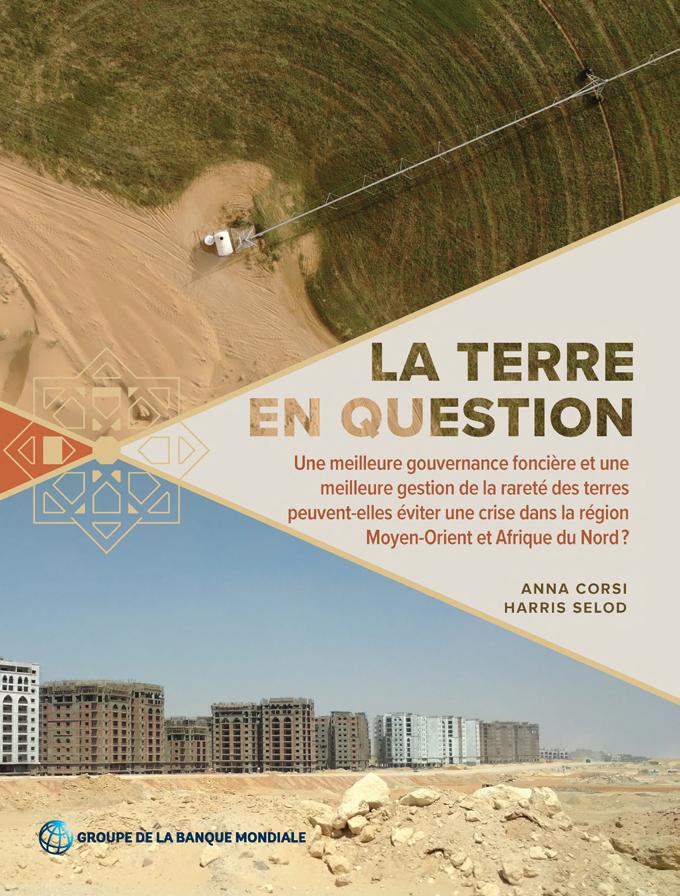
Can Better Governance and Management of Scarcity Prevent a Looming Crisis in the Middle East and North Africa?
By Anna Corsi and Harris Selod
Across the Middle East and North Africa (MENA) region, land is scarce and valuable. Demand for land is projected to dramatically increase to meet the needs of a fast-growing urban population. At the same time, the supply of land is restricted by weak governance and climate factors, causing the quasiexhaustion of cultivable land reserves. As a result, a crisis is looming—yet, land continues to be used inefficiently, inequitably, and unsustainably.
Land Matters: Can Better Governance and Management of Scarcity Prevent a Looming Crisis in the Middle East and North Africa? identifies and analyzes the economic, environmental, and social challenges associated with land in the MENA region, shedding light on policy options and proposing paths to reform. It concludes that MENA countries need to act promptly, think more holistically about land, reassess the strategic trade-offs, and minimize land distortions.
This report promotes a culture of open data, transparency, and inclusive dialogue on land, while filling major data gaps. These important steps will contribute to renewing the social contract, transforming the region economically and digitally, improving women’s land rights, and facilitating recovery and reconstruction in a context of dramatic social, political, and climatic transformation.
ALSO AVAILABLE
LAND MATTERS (ENGLISH EDITION)
Can Better Governance and Management of Scarcity Prevent a Looming Crisis in the Middle East and North Africa?
February 2023. 128 pages. Stock no. C211661 (ISBN: 9781464816611). US$48.50
LAND MATTERS (ARABIC EDITION)
Can Better Governance and Management of Scarcity Prevent a Looming Crisis in the Middle East and North Africa?
February 2023. 114 pages. Stock no. C211889 (ISBN: 9781464818899). US$43.95
11 phone +1 (703) 661 1580 • in the U.S. phone +1 (800) 645 7247 • fax +1 (703) 661 1501 WORLD BANK PUBLICATIONS FLAGSHIP TITLES
June 2023. 142 pages. Stock no. C211890 (ISBN: 978-1-4648-1890-5). US$43.95
THE ECONOMICS OF WATER SCARCITY IN THE MIDDLE EAST AND NORTH AFRICA
Institutional Solutions
By Dominick de Waal, Stuti Khemani, Andrea Barone, and Edoardo Borgomeo
Despite massive infrastructure investments, countries in the Middle East and North Africa (MENA) region continue to face unprecedented water scarcity due to climate change, population growth, and socioeconomic development. Current policy regimes for managing water across competing needs are primarily determined by state control of large infrastructure. Policy makers across the region understand the unsustainability of water allocations and that increasing investments in new infrastructure and technologies to increase water supply place a growing financial burden on governments. However, standard solutions for demand management—reallocating water to higher value uses, reducing waste, and increasing tariffs—pose difficult political dilemmas that, more often than not, are left unresolved. Without institutional reform, the region will likely remain in water distress even with increased financing for water sector infrastructure.
May 2023. 226 pages.
Stock no. C211739 (ISBN: 978-1-4648-1739-7). US$43.00
The Economics of Water Scarcity in the Middle East and North Africa: Institutional Solutions confronts the persistence and severity of water scarcity in the MENA region. The report draws on the tools of public economics to address two crucial challenges facing states in the region: lack of legitimacy and trust.
Evidence from the World Values Survey shows that people in the MENA region believe that a key role of government is to keep prices down and that governments are reluctant to raise tariffs because of the risk of widespread protests. Instead of avoiding the ‘politically sensitive’ issue of water scarcity, this report argues that reform leaders and their external partners can reform national water institutions and draw on local political contestation to establish a new social contract. The crisis and emotive power of water in the region can be used to bolster legitimacy and trust and build a sustainable, inclusive, thriving economy that is resilient to climate change.
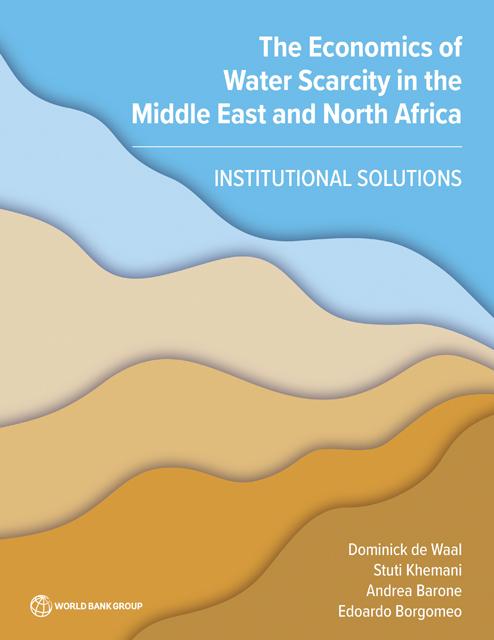
12 www.worldbank.org/publications • books@worldbank.org WORLD BANK PUBLICATIONS FLAGSHIP TITLES
BUSINESS OF THE STATE, STATE-OWNED ENTERPRISES, AND PRIVATE SECTOR DEVELOPMENT
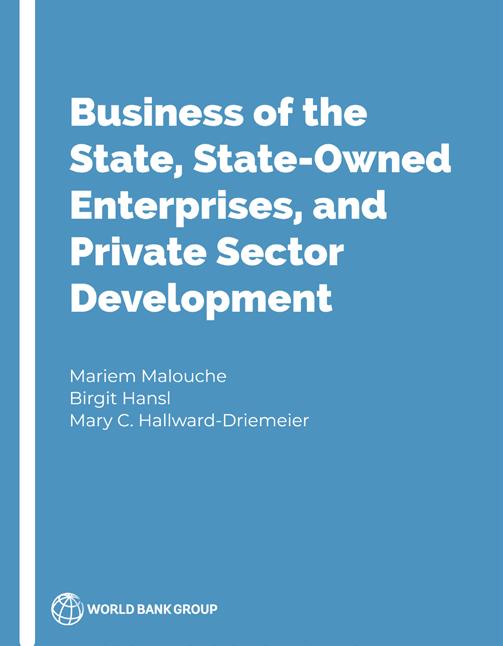 By Mariem Malouche, Birgit Hansl, and Mary C. Hallward-Driemeier
By Mariem Malouche, Birgit Hansl, and Mary C. Hallward-Driemeier
The state, as an owner of businesses, is competing and collaborating with the private sector at the firm level, market level, and economy-wide, which has profound implications for investment and growth. Governments actively participate in commercial markets in different forms, from controlling the production of goods and services to investing in firms as a minority shareholder. The impact of state participation in markets on an economy’s growth depends on the type of public-private ownership, the types of markets, and the importance of those markets in the economy. The impact also depends on how policies and institutions regulate businesses with state ownership and the markets in which they are active.
This report uses new evidence to update the understanding of how different ownership arrangements across sectors and institutional settings affect private investment, productivity, technology adoption, and job creation, and also how those arrangements influence the ability of economies to respond to shocks, from pandemics to climate change.
PRIVATE CITIES

October 2023. 150 pages.
Stock no. C211998
(ISBN: 978-1-4648-1998-8). US$43.95
Outstanding Examples from Developing Countries and Their Implications for Urban Policy
By Yue Li and Martin Rama
Institutional constraints and weak capacity often hamper the ability of local governments in developing countries to steer urbanization. As a result, there are not enough cities to accommodate an unabated rural-urban migration, and many of the cities that emerge are sprawling and disconnected. The flipside is the emergence of entire cities—more than gated communities or industrial parks—led in whole or in part by private actors. To date, little systematic research has been conducted on the conditions that are necessary for such unusual entities to emerge, on the roles played by private actors, or on the consequences for efficiency and equity. This report aims to fill this gap. Using an analytical framework that draws on urban economics and political science, it includes inventories of private cities in the Arab Republic of Egypt, India, Indonesia, and Pakistan and provides structured reviews of 14 outstanding examples across all developing regions.
URBAN DEVELOPMENT
June 2023. 274 pages.
Stock no. C211833
(ISBN: 978-1-4648-1833-2). US$49.50
13 phone +1 (703) 661 1580 • in the U.S. phone +1 (800) 645 7247 • fax +1 (703) 661 1501 WORLD BANK PUBLICATIONS FEATURED TITLES
LEVERAGING TRADE FOR MORE AND BETTER JOBS IN DEVELOPING COUNTRIES
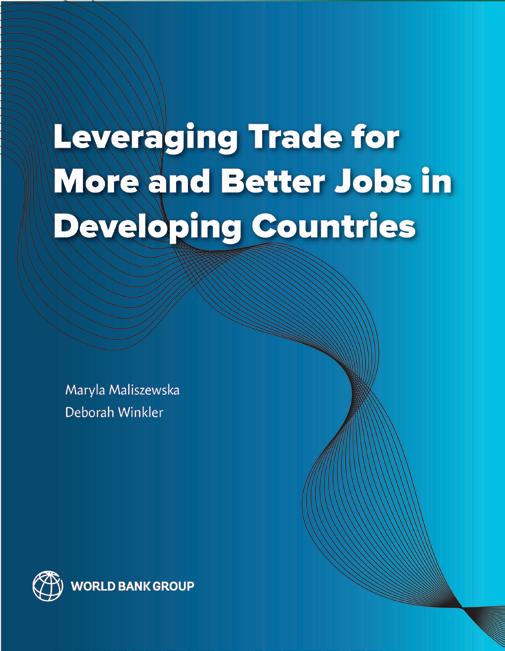 By Maryla Maliszewska and Deborah Winkler
By Maryla Maliszewska and Deborah Winkler
This report has two goals: first, to better understand how trade integration impacts the quantity and quality of jobs in developing countries and the underlying channels through which workers adjust; and second, to offer data, analytics, and a clear framework to help policymakers maximize the aggregate labor market gains from trade while minimizing the adjustment costs for workers. The conceptual framework of this report highlights four factors underlying how trade impacts labor markets: (1) the nature of trade integration; (2) characteristics of people and jobs; (3) labor market channels; and (4) policies that influence all of these factors.
September 2023. 200 pages.
Stock no. C212012 (ISBN: 978-1-4648-2012-0). US$49.50
The report benefits from newly created datasets and analysis that identify different specialization patterns of activities performed in exports and global value chains, and quantify worker transitions out of informality or unemployment. It also offers a comprehensive policy framework for leveraging trade for more and better jobs in developing countries, distinguishing policies for people, sectors, and places. Policy priorities between countries vary, depending on the nature of trade integration and their extent of structural transformation.
TRADE AND CLIMATE CHANGE Policy Considerations for Developing Countries
By Paul Brenton, Vicky Chemutai, Maryla Maliszewska, and Iryna Sikora
Historically, developing countries have contributed marginally to the global climate change problem, and yet today, they are suffering the most adverse consequences. Furthermore, to address mitigation and adaptation to climate change, developing countries must also contribute to collective solutions. How they navigate this transition will be framed by 1) how trade and climate policies are designed or revised, and 2) the extent to which these policies deliver effective, efficient, and equitable outcomes.
To contribute to this debate, this report provides rigorous analysis and proposes tools that can be used to guide policymakers in developing countries on key issues related to trade. Part 1 analyzes climate change and the evolving comparative advantages of developing country trade; Part 2 takes an in-depth look into the design of climaterelated trade policy instruments that support trade in developing countries; Part 3 concludes with a summary of how developing countries, with support from the World Bank and others, can respond to these twin challenges.
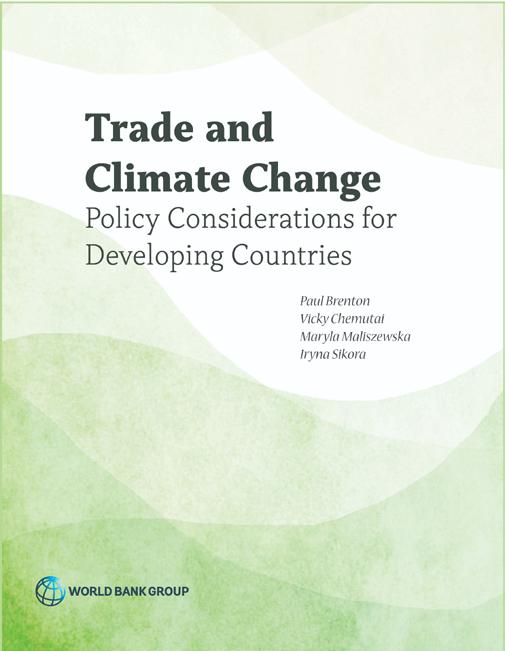
October 2023. 300 pages.
Stock no. C212013 (ISBN: 978-1-4648-2013-7). US$54.95
14 www.worldbank.org/publications • books@worldbank.org WORLD BANK PUBLICATIONS
FEATURED TITLES
THE EFFECT OF MULTINATIONAL ENTERPRISES ON CLIMATE CHANGE
Supply Chain Emissions, Green Technology Transfers, and Corporate Commitments
 By Victor Steenbergen and Abhishek Saurav
By Victor Steenbergen and Abhishek Saurav
Multinational enterprises (MNEs) provide both a fundamental risk to and an opportunity for climate change mitigation. The climate ambitions of MNEs will affect the environmental performance of countries around the world. Proactive MNEs can impose sustainability standards or encourage green technology transfers that, in some cases, could affect millions of producers and accelerate the climate transition. However, obstructive MNEs may equally hold back any progress to reduce a country’s emissions via inaction or by actively resisting, obstructing, or lobbying against change.
The report answers four key questions related to the relationship between MNEs and climate change: 1) What effect do MNEs currently have on climate change, both through their own activities and through the emissions of their broader supply chains? 2) How do MNEs shape the potential transfer of green technologies to domestic firms, and how do different types of interactions with MNEs stimulate such technology transfers? 3) How committed are leading MNEs to transitioning their supply chains to net-zero emissions by 2050, and do they have long-, medium-, and short-range strategies to realize this? and 4) What types of policies can influence MNEs’ effects on climate change?
MISALLOCATION OF FIRM FINANCING
New Evidence and Policy Implications for Developing Countries
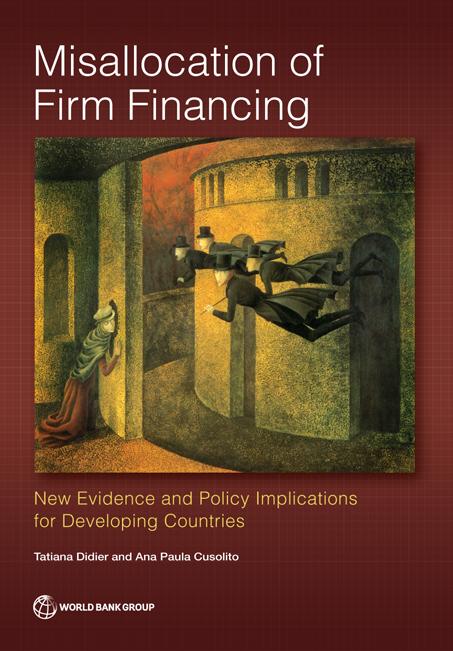 By Tatiana Didier and Ana Paula Cusolito
By Tatiana Didier and Ana Paula Cusolito
Access to finance is critical to ensuring productive investments. Yet a myriad of financial distortions, frictions, and market failures can prevent the efficient allocation of financial resources toward the most productive firms and uses and negatively impact aggregate productivity and economic growth. Drawing from a newly constructed dataset of 2.5 million private firms, this report presents novel evidence about the productivity gains that low- and middle-income countries can obtain by removing financial distortions and fostering efficient and inclusive financial markets.
August 2023. 150 pages.
Stock no. C211939
(ISBN: 978-1-4648-1939-1). US$43.95
15 phone +1 (703) 661 1580 • in the U.S. phone +1 (800) 645 7247 • fax +1 (703) 661 1501 WORLD BANK PUBLICATIONS FEATURED TITLES
The Effect of Multinational Enterprises on Climate Change The Effect of Multinational Enterprises on Climate Change Supply Chain Emissions, Green Technology Transfers, and Corporate Commitments Victor Steenbergen and Abhishek Saurav CLIMATE CHANGE AND DEVELOPMENT
2023. 140 pages. Stock no. C211994 (ISBN: 978-1-4648-1994-0). US$43.95
June
PROJECT
WORLD BANK PRODUCTIVITY
REALITY CHECK
Lessons for 25 Policies Advancing a Low-Carbon Future
By the World Bank
CLIMATE CHANGE AND DEVELOPMENT
September 2023. 155 pages.
Stock no. C211996 (ISBN: 978-1-4648-1996-4). US$43.95
Reality Check: Lessons for 25 Policies
Advancing a Low-Carbon Future contributes to an evolving analytical agenda on policies that reduce the impacts of climate change by minimizing carbon emissions whilst pursuing strategic development goals. It builds on the World Bank’s 2015 report, Decarbonizing Development: Three Steps to a Zero-Carbon Future . While it does not address all dimensions of climate policy and development, it recommends selected priority policies and key lessons drawing from case studies around the world to enhance synergies between development and climate objectives in different country contexts. It does this by first capturing the current global trends with respect to climate impacts and risks, emission sources with past and future trends. Key decarbonization policies trends over the last three decades across regions, sectors, and types of policies are then discussed with considerations of planning for a future with zero net emissions, getting the prices and policies right, smoothing the transition, managing the political economy, and protecting the poor.
CATALYZING THE GREEN DIGITAL TRANSFORMATION IN LOW- AND MIDDLE-INCOME ECONOMIES
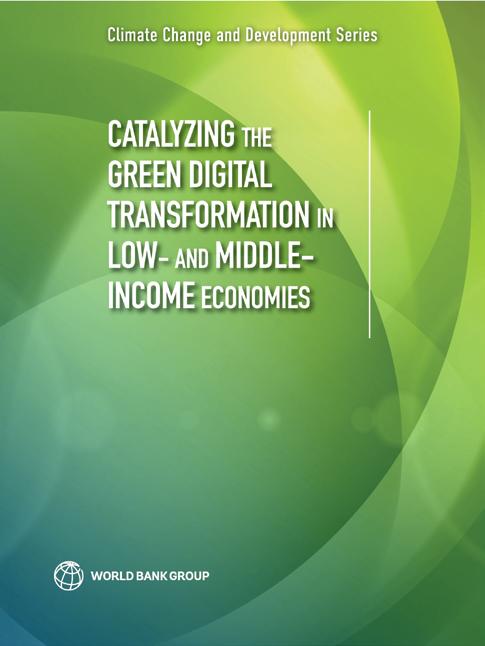 By the World Bank
By the World Bank
Digital technologies have become prevalent in all aspects of economic and social life, changing the way production and consumption take place. And—potentially—also shaping climate change action.
Green digital transformation can help countries adapt effectively to the impacts of climate change and create greener growth pathways. This report illuminates the two channels through which digital technologies intersect with climate change, and proposes a path toward low-emissions applications of digital technologies.

The digital economy relies on devices and networks whose production, use, and disposal require energy. To contribute proportionally to the reduction of global warming, greenhouse gas emissions along the digital value chain must be reduced by half by 2030.
CLIMATE CHANGE AND DEVELOPMENT
September 2023. 130 pages.
Stock no. C212002 (ISBN: 978-1-4648-2002-1). US$43.95
Governments, private companies, nongovernmental and scientific organizations, and the public at large share the burden and challenge of climate action. Governments have a stake in clearing the way for the digital sector to use the full power of digital technology to advance mitigation and adaptation, while mitigating the climate impacts of increased digitization.
16 www.worldbank.org/publications • books@worldbank.org WORLD BANK PUBLICATIONS
FEATURED TITLES
Lessons from 25 Policies Advancing a Low-Carbon Future Climate Change and Development Series
REALITY CHECK
THE POLITICAL ECONOMY OF CLIMATE ACTION
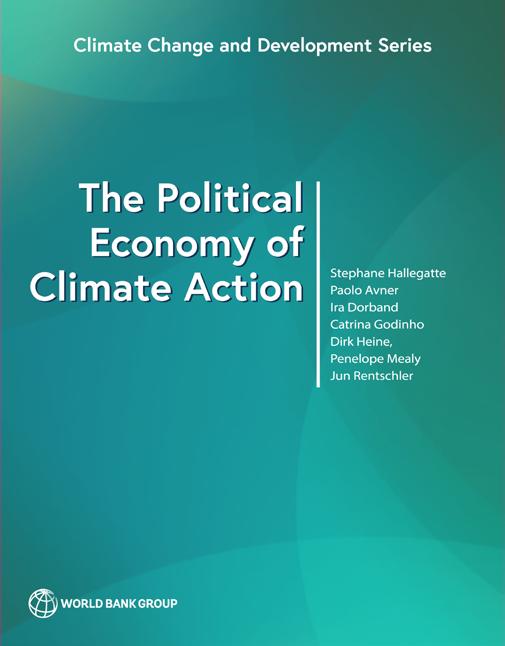 By Stephane Hallegatte, Paolo Avner, Ira Dorband, Catrina Godinho, Dirk Heine, Penelope Mealy, and Jun Rentschler
By Stephane Hallegatte, Paolo Avner, Ira Dorband, Catrina Godinho, Dirk Heine, Penelope Mealy, and Jun Rentschler
Climate change is a defining challenge of our time—and we know how to stop it: stabilize the climate by cutting emissions to net zero by mid-century, while developing pathways to resilient, sustainable development. The world has committed to doing just that, and 139 countries and counting already have net zero targets in place. But commitments are not yet translating into policies and investments at the pace or scale required, because they are often hampered by politics, vested interests, and competing needs.
This report looks at the political economy of the net zero policy, from the common challenges to the development of strategies to overcome them. It shows how governments can improve political economy conditions over time with progressive climate governance interventions, while overcoming more immediate barriers with better policy design and communication. By addressing political economy issues, such as distributional conflicts or ideational opposition, these strategies can unlock progress to increase the feasibility, fairness, and effectiveness of net zero policy—thus turning climate goals into climate action.
CHANGE CANNOT WAIT
Building Resilient Health Systems in the Shadow of COVID-19
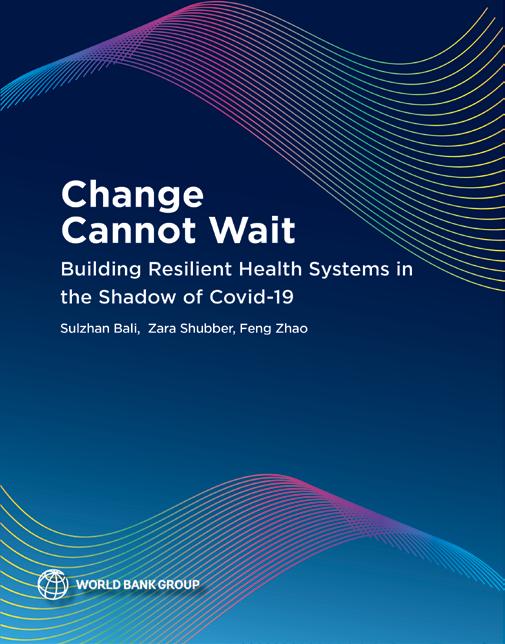 By Sulzhan Bali, Zara Shubber, and Feng Zhao
By Sulzhan Bali, Zara Shubber, and Feng Zhao
The devastating health, economic, and societal impacts of the COVID-19 pandemic remain on every continent. This global pandemic underscored how unprepared we are for a public-health emergency of staggering proportions. And yet potentially graver health threats loom. The increasing number of acute infectious diseases combined with trends such as population aging, chronic-disease burdens, and climate change raises the risk of syndemics—events in which two or more diseases adversely interact with each other— and with political and economic conditions of inequality and poverty. The only way to prevent, prepare for, and manage these threats is by building resilient health systems to withstand shocks and improve health outcomes between crises.
Using country examples, this report shows how strengthening resilience is within every country’s reach, even those with low incomes. It describes the key features of resilient systems as integrated systems that are aware of threats; agile in response to evolving needs; absorptive of shocks; adaptive to minimize disruptions; and able to transform after crises based on lessons learned. The report makes recommendations for countries to operationalize resilience based on a framework that prioritizes investments according to their impact.
CLIMATE CHANGE AND DEVELOPMENT
October 2023. 120 pages.
Stock no. C211953
(ISBN: 978-1-4648-1953-7). US$43.95
September 2023. 100 pages.
Stock no. C212015
(ISBN: 978-1-4648-2015-1). US$43.95
17 phone +1 (703) 661 1580 • in the U.S. phone +1 (800) 645 7247 • fax +1 (703) 661 1501 WORLD BANK PUBLICATIONS
FEATURED TITLES
SILVER OPPORTUNITY CASE STUDIES
Experiences with Building Integrated Services for Older Adults around Primary Health Care
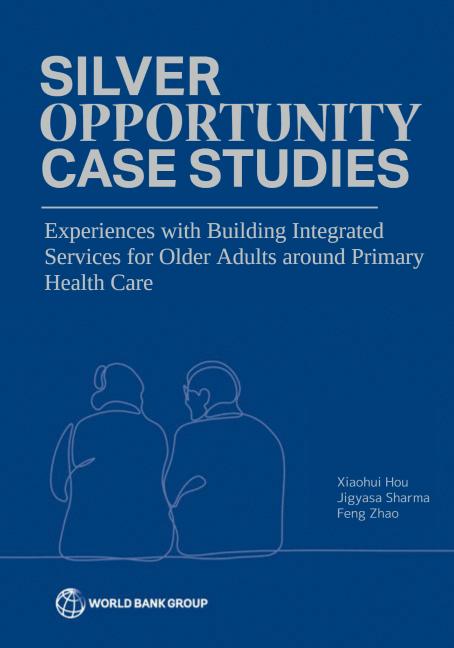 By Xiaohui Hou, Jigyasa Sharma, and Feng Zhao
By Xiaohui Hou, Jigyasa Sharma, and Feng Zhao
Health care systems must be prepared to address the expanding and complex needs of an aging population. Rather than a “silver challenge,” this should be seen as an opportunity to reevaluate and reorganize healthcare delivery systems holistically.
The country and regional case studies compiled in this volume provide a comprehensive examination of care for older adults in diverse economic and geographical contexts. The volume includes practical insights for decision making, knowledge sharing, and cross learning. It complements a synthesis volume of global evidence— Silver Opportunity: Building Integrated Services for Older Adults around Primary Health Care —offering a deeper understanding of the complexities, key issues, and current practices. The overarching goal of the volume is to inform policy makers, healthcare professionals, and other stakeholders about effective practices for caring for older adults and support the development of evidence-based policies that enhance their health and well-being.
November 2023. 170 pages.
Stock no. C212014 (ISBN: 978-1-4648-2014-4). US$43.95
ALSO AVAILABLE SILVER OPPORTUNITY
Building Integrated Services for Older Adults around Primary Health Care
March 2023. 212 pages. Stock no. C211958 (ISBN: 9781464819582). US$49.95
FALLING LONG-TERM GROWTH PROSPECTS Trends, Expectations, and Policies
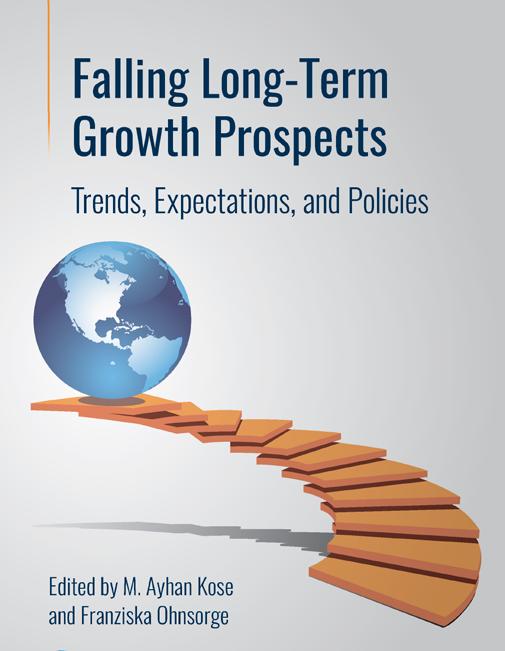 Edited by M. Ayhan Kose and Franziska Ohnsorge
Edited by M. Ayhan Kose and Franziska Ohnsorge
A structural growth slowdown is underway across the world: at current trends, the global potential growth rate is expected to fall to a three-decade low over the remainder of the 2020s. Nearly all the forces that have powered growth and prosperity since the early 1990s have weakened, not only because of a series of shocks to the global economy over the past three years. A persistent and broad-based decline in long-term growth prospects imperils the ability of emerging market and developing economies to combat poverty, tackle climate change, and meet other key development objectives. These challenges call for an ambitious policy response at the national and global levels. This book presents the first detailed analysis of the growth slowdown and a rich menu of policy options to deliver better growth outcomes.
November 2023. 564 pages.
Stock no. C212000
(ISBN: 978-1-4648-2000-7). US$63.00
18 www.worldbank.org/publications • books@worldbank.org WORLD BANK PUBLICATIONS
FEATURED TITLES
THE PATH TO 5G IN THE DEVELOPING WORLD Planning Ahead for a Smooth Transition
to the Fifth Generation of Mobile Technology
By Rami Amin, Niccolo Comini, Vivien Foster, Natalija Gelvanovska-Garcia, Kay Kim, Hyea Won Lee, Maria Claudia Pachon, Je Myung Ryu, and Zhijun William Zhang
The global race for 5G has seen countries riding a new wave of wireless technology. 5G is the next-generation mobile communication technology, with the capacity to enable a significantly higher level of performance over 4G mobile communications. With the estimated impact of 5G on global GDP in the trillions of US dollars, 5G will drive innovation, job creation, productivity, and competitiveness across a range of sectors.
For some countries, 5G services may seem a distant future prospect; for others, it is an onramp to the Fourth Industrial Revolution and has been folded into national strategy planning. 5G trials, pilots, and commercial deployments have been progressing across the world, but most deployments are in higher-income countries. Significant barriers remain for developing countries that threaten to further widen the digital divide and limit access to the economic opportunities that 5G connectivity enables.

What does this mean for developing countries, and how can governments prepare? This report explores how countries can reach connectivity goals by using 5G as a layer of connectivity alongside 4G and other modalities of connectivity. It also provides a guide for policy makers on the opportunities, challenges, and risks posed by 5G so they can plan for an enabling policy and regulatory ecosystem that support the path to advanced mobile network deployment, access, and adoption.
September 2023. 200 pages. Stock no. C211604 (ISBN: 978-1-4648-1604-8). US$48.50
PRIMER ON LARGE-SCALE ASSESSMENTS OF EDUCATIONAL ACHIEVEMENT (FRENCH EDITION)
By Marguerite Clarke and Diego Luna-Bazaldua
To improve their education systems, countries around the world have increasingly initiated national assessment programs or participated in international or regional largescale assessment studies for the first time. Well-constructed large-scale assessments can provide credible information on student achievement levels, which, in turn, can promote better resource allocation to schools, stronger education service delivery, and improved learning outcomes.
Primer on Large-Scale Assessments of Educational Achievement is a first-stop resource for those wanting to understand how to design, administer, analyze, and use the results from these assessments of student achievement. The book addresses frequently asked questions from people working on large-scale assessment projects and those interested in making informed decisions about them. Each chapter introduces a stage in the assessment process and offers advice, guidelines, and country examples. This book also reports on emerging trends in large-scale assessment and provides updated information on international and regional large-scale assessment programs.
June 2023. 172 pages.
Stock no. C211978
(ISBN: 978-1-4648-1978-0). US$43.95
19 phone +1 (703) 661 1580 • in the U.S. phone +1 (800) 645 7247 • fax +1 (703) 661 1501 WORLD BANK PUBLICATIONS FEATURED TITLES
SUSTAINABLE INFRASTRUCTURE
Évaluations nationales des acquis scolaires MANUEL POUR LES ÉVALUATIONS À GRANDE ÉCHELLE DES ACQUIS SCOLAIRES Marguerite Clarke et Diego Luna-Bazaldua NATIONAL ASSESSMENTS
OF EDUCATIONAL ACHIEVEMENT
THE GOVERNMENT ANALYTICS HANDBOOK
Leveraging Data to Strengthen Public Administration
Edited by Daniel Rogger and Christian Schuster
The Government Analytics Handbook presents frontier evidence and practitioner insights on how to leverage data to strengthen public administration. Covering a range of microdata sources—such as administrative data and public servant surveys—as well as hands-on tools and resources for undertaking the analytics, it transforms the ability of governments to take a data-informed approach to diagnose and improve how public organizations work.
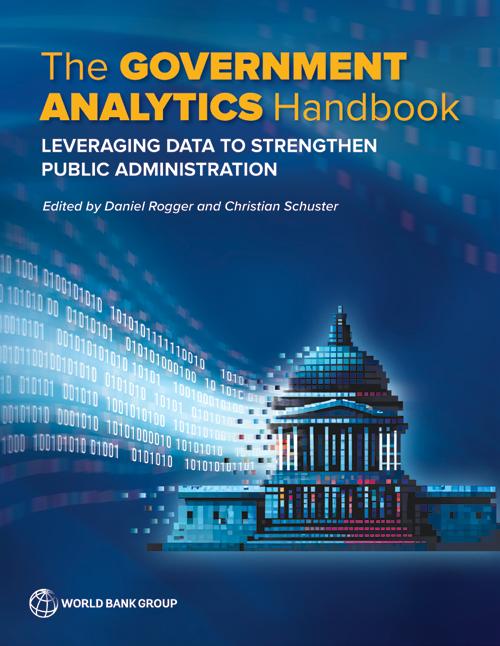
Available for order as a single volume in print or digital formats, or online at worldbank.org/governmentanalytics, with modular access and additional hands-on tools. The handbook is a must-have for practitioners, policy makers, academics, and government agencies.
July 2023. 800 pages.
Stock no. C211957 (ISBN: 978-1-4648-1957-5). US$83.00
“This pioneering handbook shows how microdata can be used to give scholars and practitioners granular and real insights into how states work, and practical guidance on the process of state-building.”
— Francis Fukuyama, Stanford University, author of State-Building: Governance and World Order in the 21st Century
WORKING
WITH SMALLHOLDERS
A Handbook for Firms Building Agribusiness Supply Chains, Third Edition
By International Finance Corporation
Thi s handbook aims to enable the development of more sustainable, resilient, and productive agribusiness supply chains and to illustrate their developmental impact. Smallholder farmers present both opportunities and challenges for agribusinesses. The predominance of smallholders in many frontier and emerging markets makes them an integral part of agribusiness supply chains.
The third edition compiles innovative solutions to these challenges, incorporating case studies from across diverse regions and agribusiness sectors. It incorporates new developments and areas of interest since the last edition, including the growing predominance of digital technologies and increasing concerns around sustainability.
August 2023. 472 pages.
Stock no. C211962 (ISBN: 978-1-4648-1962-9). US$54.95
20 www.worldbank.org/publications • books@worldbank.org WORLD BANK PUBLICATIONS FEATURED TITLES
WORKING WITH SMALLHOLDERS THIRD EDITION A handbook for firms building sustainable supply chains
THE COMMONS Drivers of Change and Opportunities for Africa
Edited by Stéphanie Leyronas, Benjamin Coriat, and Kako Nubukpo
The Commons explores the many forms of development being championed by Africa’s residents, users, and citizens. In addition to managing property and shared tangible and intangible resources collectively, communities are experimenting with a concept of “commoning” founded on values such as community, engagement, reciprocity, and trust. In practice, their approach takes the form of land-based commons, housing cooperatives, hybrid cultural spaces or places for innovation, and collaborative digital platforms.
This report examines historical and recent practices and new theories in commons scholarship. It also examines the tensions, drivers of change, and opportunities that surround commons dynamics in Africa. In addition, it highlights the abundance of commons-based entrepreneurial processes in Sub-Saharan Africa and shows that partnerships between African public authorities and communities involved in the commons can be powerful drivers of sustainable development for the continent.
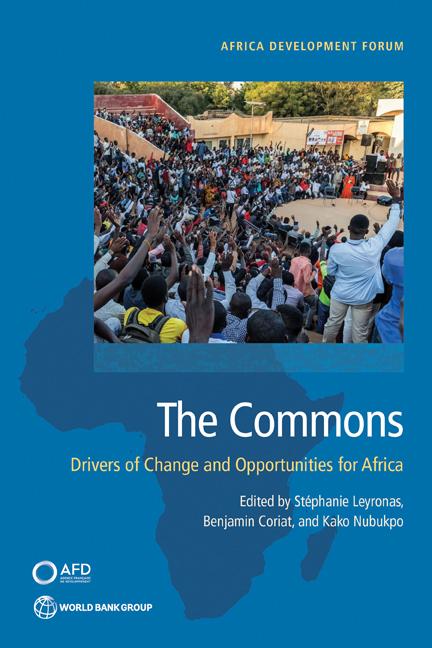
Authored by the Agence francaise de developpement (AFD), this publication is a new title in the Africa Development Forum, a series copublished by the AFD and the World Bank.
MIGRANTS, MARKETS, AND MAYORS
Rising above the Employment Challenge in Africa's Secondary Cities
Edited by Luc Christiaensen and Nancy Lozano
In our rapidly urbanizing world, mayors often see migrants as a burden to their cities’ labor markets and a threat to their development. Drawing on national household surveys and four secondary city case studies in Africa, this report finds that migrants— being younger, better educated, and complementary to the resident labor force—can strengthen the urban labor force.
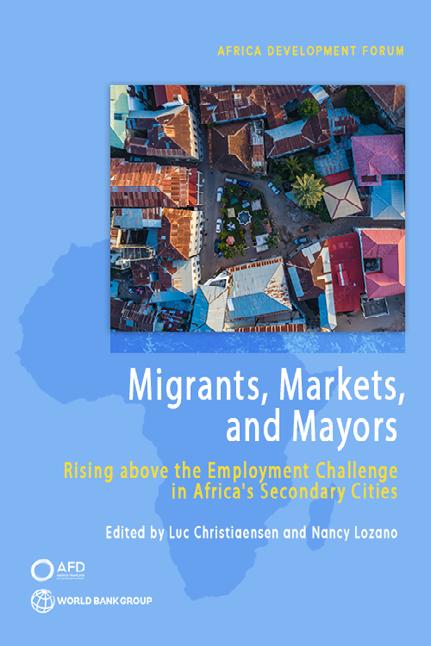
Labor market outcomes for migrants generally are at least as good as those for residents. Migrants also contribute increasingly less to urban population growth. Secondary cities and towns appear particularly well placed to leverage migration if they have good urban management that develops land and labor markets, prepares for growth, and benefits everyone, migrants as well as residents. Migrant-specific interventions are warranted when divisions between natives and migrants are deep. Strengthening the financial, technical, and planning capacity of towns and secondary cities to better integrate migrants is part and parcel of the good jobs agenda.
AFRICA DEVELOPMENT FORUM
July 2023. 254 pages.
Stock no. C211960
(ISBN: 978-1-4648-1960-5). US$49.50
AFRICA DEVELOPMENT FORUM
August 2023. 180 pages.
Stock no. C211903
(ISBN: 978-1-4648-1903-2). US$43.95
21 phone +1 (703) 661 1580 • in the U.S. phone +1 (800) 645 7247 • fax +1 (703) 661 1501 WORLD BANK PUBLICATIONS AFRICA
EXPORTS TO IMPROVE LABOR MARKETS IN THE MIDDLE EAST AND NORTH AFRICA
Edited by Gladys Lopez-Acevedo and Raymond Robertson
In the Middle East and North Africa (MENA) region, trade liberalization measures have coincided with stable economic growth, and GDP per capita growth has surpassed that of other developing regions. However, MENA’s labor-market outcomes—such as average wage levels, informality rate, and female labor force participation—continue to underperform. Why has rising trade failed to produce better labor market outcomes in low- and middle-income countries in the region?
This report focuses on the impact of trade policy on trade-flows and their relationship with local labor market outcomes in three low- and middle-income countries—the Arab Republic of Egypt, Morocco, and Tunisia. Given their idiosyncratic labor markets, export diversification, and trade policy history, these three countries offer important lessons for economic development in the region. Policy makers and stakeholders can use these findings to design policies to improve the chances that higher trade flows will deliver better labor market outcomes and ensure that the benefits are more equally shared.
MIDDLE

June 2023. 188 pages.
Stock no. C211972 (ISBN: 978-1-4648-1972-8). US$43.95
INFORMALITY AND INCLUSIVE GROWTH IN THE MIDDLE EAST AND NORTH AFRICA
By Gladys Lopez-Acevedo, Marco Ranzani, Nistha Sinha, and Adam Elsheikhi
The long-standing informality debate in the Middle East and North Africa (MENA) region has taken on a new urgency as it looks for a pathway to more socially inclusive growth that is less reliant on fossil fuels. This is occurring against a backdrop of subpar labor market outcomes, further growth setbacks, and deteriorating fiscal and current account deficits in the aftermath of the COVID-19 pandemic—and in the wake of high inflation and supply chain disruptions triggered by the Russian Federation-Ukraine war.
This report aims to better understand the characteristics and incentive structure that have led to the prevalence of informal employment in three MENA countries—the Arab Republic of Egypt, Morocco, and Tunisia. The report breaks new ground by adopting a comprehensive perspective to focus on the features of, and interrelationships among, different aspects of these countries’ institutional landscapes to make sense of the complex incentive structure that workers and firms face when deciding between formal and informal options. Specifically, the report groups these issues in three broad realms:

MIDDLE EAST AND NORTH AFRICA DEVELOPMENT REPORT
June 2023. 310 pages.
Stock no. C211988 (ISBN: 978-1-4648-1988-9). US$49.50
(1) entrepreneur-worker relations,
(2) taxes and transfers, and (3) market conditions.

22 www.worldbank.org/publications • books@worldbank.org WORLD BANK PUBLICATIONS MIDDLE EAST AND NORTH AFRICA
MIDDLE EAST AND NORTH AFRICA DEVELOPMENT REPORT
Gladys Lopez-Acevedo and Raymond Robertson, Editors
Exports to Improve Labor Markets in the Middle East and North Africa
EAST AND NORTH AFRICA DEVELOPMENT REPORT
INNOVATIVE KOREA

Leveraging Innovation and Technology for Development
























 Edited by Hoon Sahib Soh, Youngsun Koh, and Anwar Aridi
Edited by Hoon Sahib Soh, Youngsun Koh, and Anwar Aridi
The Republic of Korea today is a highly industrialized, global leader in innovation and technology. It is the twelfth largest economy in the world and has a per capita income at the average of OECD countries. In the 1950s, however, it was one of the world’s poorest countries, with decidedly bleak prospects. This transformation has made Korea a wellknown case study of successful development.
This report summarizes the sources of Korea’s remarkable growth and the policies and institutional reforms that made it possible. In particular, the report focuses on Korea’s successful transition from a middle-income to a high-income economy and how it escaped the “middle-income trap” by fundamentally transforming its growth model in response to the Asian Financial Crisis of 1997-98: moving toward a more private-sectorled model with greater emphasis on market competition, innovation, and technology. Instead of targeting large firms and industries, industrial policies prioritized small and medium enterprises and technology entrepreneurs. Exports expanded significantly through greater integration in global value chains. Already-high levels of human capital development were complemented by an expanded social safety net and a more integrated approach to education and training.




July 2023. 316 pages.
Stock no. C211961 (ISBN: 978-1-4648-1961-2). US$60.50
ENGENDERING ACCESS TO STEM EDUCATION AND CAREERS IN SOUTH ASIA

 By Shobhana Sosale, Graham Mark Harrison, Namrata Tognatta, Shiro Nakata, and Priyal Mukesh Gala
By Shobhana Sosale, Graham Mark Harrison, Namrata Tognatta, Shiro Nakata, and Priyal Mukesh Gala
Building a skilled and diverse science, technology, engineering, and mathematics (STEM) workforce is crucial for economic development, cross-border trade, and social inclusion in South Asia. However, underrepresentation of girls and women in STEM education and careers remains a persistent issue. What kinds of macro and micro socioeconomic interventions are needed to increase girls’ and women’s access to and participation in STEM education and careers in South Asia?
This book compares trends in South Asia with global trends to examine how access to and choices of STEM fields affect girls’ enrollment in upper secondary education, technical and vocational education and training, and higher education in the region as well as their selection of careers.
SOUTH ASIA DEVELOPMENT FORUM
July 2023. 108 pages.




































































Stock no. C211966












New ways of defining STEM occupations are required to help develop and sustain female interest in STEM education and careers. Potential strategies that governments can pursue include raising awareness and building knowledge and skills in STEM outside the formal academic environment—such as in after-school programs, science fairs and competitions, and summer camps—and developing and systematically disseminating standardized resources. Inclusion must be championed by governments, the private sector, and other stakeholders who stand to benefit from more diverse workforces. Though women themselves would likely be credible champions, in South Asia they are often constrained by a range of factors. This report addresses some of those obstacles.
(ISBN: 978-1-4648-1966-7). US$35.00
23 phone +1 (703) 661 1580 • in the U.S. phone +1 (800) 645 7247 • fax +1 (703) 661 1501 WORLD BANK PUBLICATIONS EAST ASIA AND PACIFIC · SOUTH ASIA
INNOVATIVE KOREA Edited by Hoon Sahib Soh, Youngsun Koh, and Anwar Aridi Leveraging Innovation and Technology for Development
The International Development in Focus series comprises original, well-developed studies that highlight current development issues and are intended to influence programs and policy. These books result from research and analysis carried out as part of the World Bank’s operational work around the world.
A BALANCING ACT FOR BRAZIL’S AMAZONIAN STATES
An Economic Memorandum
Edited by Marek Hanusch
Social deprivations coincide with vast deforestation in Brazil's Legal Amazon, or Amazônia. Poverty reduction and sustainable development require renewed efforts to protect the region's exceptional natural wealth, coupled with a shift from an extractive to a productivity-oriented growth model.
INTERNATIONAL DEVELOPMENT IN FOCUS
May 2023. 320 pages. Stock no. C211909 (ISBN: 978-1-4648-1909-4).
US$52.95
ENHANCING STEM EDUCATION AND CAREERS IN SRI LANKA
By Shalika Subasinghe, Shobhana Sosale, and Harsha Aturupane
This report examines how access to and choice on science, technology, engineering, and mathemetics (STEM) affect enrollments in upper secondary, technical, and vocational education and training, and higher education in Sri Lanka. The goal is to increase access to and participation in STEM programs and careers.
INTERNATIONAL DEVELOPMENT IN FOCUS
June 2023. 72 pages. Stock no. C212004 (ISBN: 978-1-4648-2004-5).
US$35.00
INVESTING IN REPRODUCTIVE AND CHILD HEALTH IN UGANDA
What Have We Learned, and Where Do We Go From Here?
Edited by Julia Mensah, Stephen Kiirya, Elizabeth Asege Ekochu, Rogers Ayiko, Brendan Michael Hayes, Collins Chansa, Richard Crabbe, and Marc DeFrancis
This compendium presents the results of a three-year program instituted in Uganda to assess the status of reproductive, maternal, newborn, child, and adolescent health services, and to propose recommendations to improve their delivery and uptake.
INTERNATIONAL DEVELOPMENT IN FOCUS
September 2023. 446 pages. Stock no. C211993 (ISBN: 978-1-4648-1993-3).
PORTUGUESE EQUILÍBRIO DELICADO PARA A AMAZÔNIA LEGAL BRASILEIRA
ALSO AVAILABLE IN
Um Memorando Econômico
INTERNATIONAL DEVELOPMENT IN FOCUS
June 2023. 348 pages. Stock no. C211913 (ISBN: 978-1-4648-1913-1).
US$52.95
AIR POLLUTION AND CLIMATE CHANGE From Co-Benefits to Coherent Policies
By Grzegorz Peszko, Markus Amann, Yewande Awe, Gary Kleiman, and Tamer Samah Rabie
While many countries pledge to phase out fossil fuels in 30 to 40 years, an estimated 6 to 7 million people die each year from air pollution. This report shows how to design coherent policies that harness synergies, manage tensions between air quality and climate mitigation, and that put people's health first while paving the way for long-term decarbonization.
INTERNATIONAL DEVELOPMENT IN FOCUS
March 2023. 130 pages. Stock no. C211835 (ISBN: 978-1-4648-1835-6).
US$41.95
US$57.50
RISING FROM THE DEPTHS
Water Security and Fragility in South Sudan
By Edoardo Borgomeo, Claire Chase, Nicolas Salazar Godoy, and Victor Osei Kwadwo
South Sudan is the third most vulnerable country to climate change in the world, and one of the most politically fragile. This report illustrates how South Sudan can leverage its water resources to prepare for climate change and advance national peace and development.
INTERNATIONAL DEVELOPMENT IN FOCUS
February 2023. 170 pages. Stock no. C211943 (ISBN: 978-1-4648-1943-8).
US$41.95
24 www.worldbank.org/publications • books@worldbank.org WORLD BANK PUBLICATIONS INTERNATIONAL DEVELOPMENT IN FOCUS
INTERNATIONAL DEVELOPMENT IN FOCUS
SKILLS SECTOR TRANSFORMATION FOR INCLUSION, RECOVERY, AND RESILIENCE IN SRI LANKA
By Shobhana Sosale, Seo Yeon Hong, Shalika Subasinghe, and Hiran Herat Sri Lanka is at a crossroads. There is an urgent need to enhance skills in Sri Lanka to increase inclusion, support recovery, and build resilience. This report addresses these issues and provides recommendations for strengthening skills and improving education.
INTERNATIONAL DEVELOPMENT IN FOCUS
September 2023. 178 pages. Stock no. C212008 (ISBN: 978-1-4648-2008-3).
US$41.95
SOCIAL PROTECTION PROGRAM SPENDING AND HOUSEHOLD WELFARE IN GHANA
By Dhushyanth Raju, Stephen Younger, and Christabel Dadzie
The government of Ghana spends little on public social protection programs, equivalent to about 1.4 percent of GDP. This spending is predominately through social insurance programs. This study assesses the performance of the government’s main social assistance and social insurance programs.
INTERNATIONAL DEVELOPMENT IN FOCUS
August 2023. 160 pages. Stock no. C212005 (ISBN: 978-1-4648-2005-2).
US$41.95
THE LONG ROAD TO INCLUSIVE INSTITUTIONS IN LIBYA
A Sourcebook of Challenges and Needs
Edited by Hend Irhiam, Michael Schaeffer, and Kanae Watanabe
This sourcebook compiles analytical work that has been cultivated over the past several years by the World Bank and partner organizations of Libya. Utilizing several analytical techniques, the book makes a unique contribution to the discussion on Libya's medium- to long-term challenges.
INTERNATIONAL DEVELOPMENT IN FOCUS
June 2023. 450 pages. Stock no. C211922 (ISBN: 978-1-4648-1922-3).
US$57.50
INTERNATIONAL DEVELOPMENT IN PRACTICE
Books in the International Development in Practice series provide quality, practical (“how to”) guidance that can be applied by practitioners in the development arena. These books draw on experience and analysis gleaned from the World Bank’s operational work.
TOOLKIT ON DIGITAL ENTREPRENEURIAL ECOSYSTEM DIAGNOSTICS
Developing Thriving Ecosystems for Entrepreneurs and Digital Businesses
By Marcio Cruz and Tingting Juni Zhu
This toolkit provides practical resources for conducting entrepreneurial ecosystem assessments. It includes a framework, guidelines, and useful tools for performing diagnostics to inform policies supporting entrepreneurial ecosystems, including digital entrepreneurial ecosystems.
INTERNATIONAL DEVELOPMENT IN PRACTICE
September 2023. 158 pages. Stock no. C212009 (ISBN: 978-1-4648-2009-0).
US$41.95
25 phone +1 (703) 661 1580 • in the U.S. phone +1 (800) 645 7247 • fax +1 (703) 661 1501 WORLD BANK PUBLICATIONS INTERNATIONAL DEVELOPMENT IN PRACTICE
WORLD BANK PUBLICATIONS BESTSELLERS
Discover the best-selling publications from the World Bank over the last year, listed in no particular order.
WORLD DEVELOPMENT REPORT 2022 Finance for an Equitable Recovery
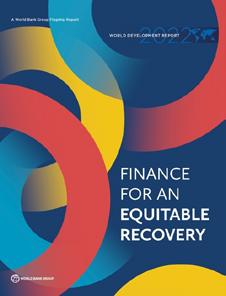
By the World Bank
World Development Report 2022 is a practical guide to help lowand-middle-income countries strengthen financial markets for a more equitable recovery from the COVID-19 economic crisis.
WORLD DEVELOPMENT REPORT

June 2022. 278 pages. Stock no. C211730 (ISBN: 978-1-4648-1730-4). US$48.50
ANALYZING BANKING RISK
A Framework for Assessing Corporate Governance and Risk Management
By Hennie van Greuning, and Sonja Brajovic Bratanovic
This publication aims to complement existing methodologies by establishing a comprehensive framework for the assessment of banks, not only by using financial data but also by considering corporate governance.
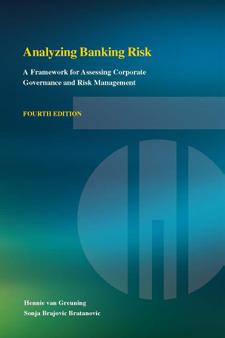
June 2020. 448 pages. Stock no. C211446 (ISBN: 978-1-4648-1446-4). US$55.00
A GUIDE TO ASSESSING NEEDS
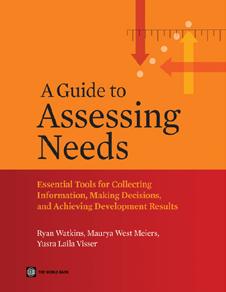
Essential Tools for Collecting Information, Making Decisions, and Achieving Development Results
By Ryan Watkins,
Maurya West Meiers, and Yusra Visser
Making informed decisions is the essential beginning to any successful development project. Before the project even begins, you can use needs assessment approaches to guide your decisions. This book is filled with practical strategies that can help you define the desired results and select the most appropriate activities for achieving them.
January 2012. 316 pages. Stock no. C18868 (ISBN: 978-0-8213-8868-6). US$49.95
BRIDGING THE TECHNOLOGICAL DIVIDE Technology Adoption by Firms in Developing Countries
By Xavier Cirera, Diego Comin,
and Marcio Cruz





Technology is a key driver of economic development. However, the extent to which firms adopt and use technologies and to what purpose is poorly understood. From a technological standpoint, firms largely remain black boxes. This report proposes a new approach to measure and understand the adoption and use of technologies by firms.
EUROPE AND CENTRAL ASIA ECONOMIC UPDATE
July 2022. 240 pages. Stock no. C211826 (ISBN: 978-1-4648-1826-4). US$49.50
GLOBAL ECONOMIC PROSPECTS, JANUARY 2023
By the World Bank
Global Economic Prospects is a World Bank Group Flagship Report that examines global economic developments and prospects, with a special focus on emerging market and developing economies.
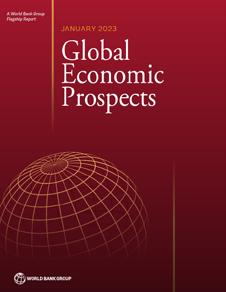
GLOBAL ECONOMIC PROSPECTS
February 2023. 194 pages. Stock no. C211906 (ISBN: 978-1-4648-1906-3). US$49.50
COMMODITY MARKETS Evolution, Challenges, and Policies
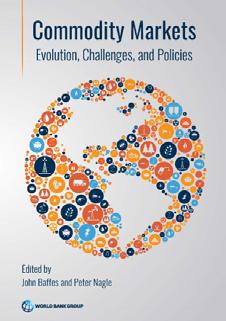

Edited by John Baffes and Peter Nagle
Commodity markets are integral to the global economy. Understanding what drives these markets is critical to design policy frameworks that enable growth, inflation stability, poverty reduction, and the climate change mitigation. This study examines market and policy developments for all commodity groups over the past century. December 2022. 292 pages. Stock no. C211911
(ISBN: 978-1-4648-1911-7). US$54.95
FOUR DECADES OF POVERTY REDUCTION IN CHINA Drivers, Insights for the World, and the Way Ahead
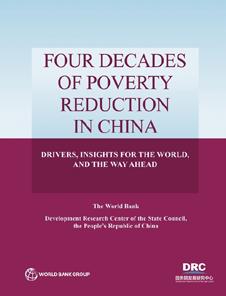
By the World Bank, Development Research Center of the State Council, and the People’s Republic of China
Over the past 40 years, the number of people in China with incomes below US$1.90 per day has fallen by close to 800 million. This report explores the key drivers for China’s achievements in poverty, considers lessons for other developing countries, and puts forward suggestions for China’s future policies
October 2022. 90 pages. Stock no. C211877



(ISBN: 978-1-4648-1877-6). US$35.00
HANDBOOK ON IMPACT EVALUATION Quantitative Methods and Practices
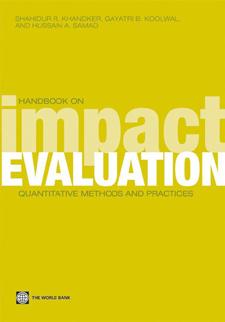 By Shahidur R. Khandker, Gayatri B. Koolwal, and Hussain A. Samad
By Shahidur R. Khandker, Gayatri B. Koolwal, and Hussain A. Samad
Public programs are designed to reach certain goals and beneficiaries. Methods to understand whether such programs actually work, as well as the level and nature of impacts on intended beneficiaries, are main themes of this book.
October 2009. 260 pages. Stock no. C18028
(ISBN: 978-0-8213-8028-4). US$49.95
26 www.worldbank.org/publications • books@worldbank.org WORLD BANK PUBLICATIONS WORLD BANK PUBLICATIONS BESTSELLERS
IMPACT EVALUATION IN INTERNATIONAL DEVELOPMENT Theory, Methods, and Practice
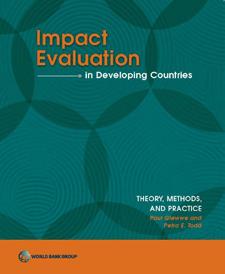 Edited by Paul Glewwe and Petra Todd
Edited by Paul Glewwe and Petra Todd
This book provides a comprehensive exposition on how to conduct impact evaluations. It covers both randomized controlled trials and non-experimental methods (such as difference-in-differences and matching methods), and also provides extensive practical advice for conducting impact evaluations.
March 2022. 422 pages. Stock no. C211497 (ISBN: 978-1-4648-1497-6). US$59.95
IMPROVING EFFECTIVE COVERAGE IN HEALTH
Do Financial Incentives Work?
QUALITY EARLY LEARNING Nurturing Children's Potential
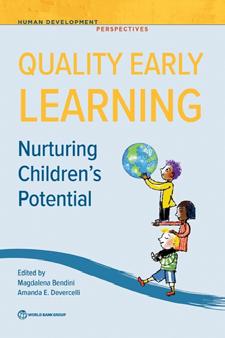 Edited by Maria Magdalena Bendini and Amanda Devercelli
Edited by Maria Magdalena Bendini and Amanda Devercelli
This report synthesizes the latest relevant knowledge from multiple disciplines on how young children learn and what skills are most crucial for school-readiness.
HUMAN DEVELOPMENT PERSPECTIVES
May 2022. 308 pages. Stock no. C211795 (ISBN: 978-1-4648-1795-3). US$48.50
WALKING THE TALK
Reimagining Primary Health Care after COVID-19
By Damien de Walque,
Eeshani Kandpal, Adam Wagstaff, Jed Friedman, Sven Neelsen, Moritz Piatti-Fünfkirchen, Anja Sautmann, Gil Shapira, and Ellen
Van de Poel
This report examines one specific policy approach to improving effective coverage: financial incentives in the form of performancebased financing or financial incentives to health workers on the front lines.
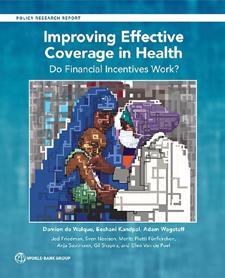
POLICY RESEARCH REPORTS
May 2022. 288 pages. Stock no. C211825
(ISBN: 978-1-4648-1825-7). US$49.50
IMPACT EVALUATION IN PRACTICE, SECOND EDITION
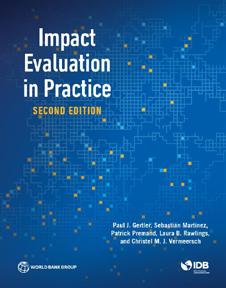 By Paul J. Gertler, Sebastian Martinez, Patrick Premand, Laura B. Rawlings, and Christel M. J. Vermeersch
By Paul J. Gertler, Sebastian Martinez, Patrick Premand, Laura B. Rawlings, and Christel M. J. Vermeersch
This handbook is a comprehensive and accessible introduction to impact evaluation for policymakers and development practitioners.
September 2016. 364 pages. Stock no. C210779
(ISBN: 978-1-4648-0779-4). US$45.00
INTERNATIONAL DEBT REPORT 2022 Updated International Debt Statistics
By the World Bank
This longstanding annual publication features external debt statistics and analysis for the 121 low- and middle-income countries that report to the World Bank Debt Reporting System (DRS).
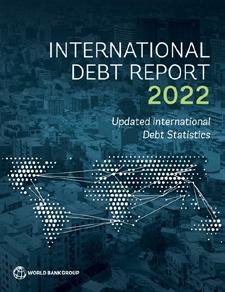
INTERNATIONAL DEBT REPORT
December 2022. 204 pages. Stock no. C211902 (ISBN: 978-1-4648-1902-5). US$49.95
By Enis Baris, Rachel Silverman, Huihui Wang, Feng Zhao, and Muhammad Ali Pate
Very few topics in global health have been as controversial as primary health care. In this book, the authors explain what it takes to reimagine primary health care in the 21st century, an era of increased rapidly changing health care needs, population expectations, availability of financial and human resources, and digital technology.
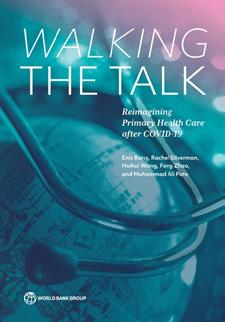
March 2022. 222 pages. Stock no. C211768 (ISBN: 978-1-4648-1768-7). US$43.95
WHERE IS THE VALUE IN THE CHAIN? Pathways out of Plastic Pollution
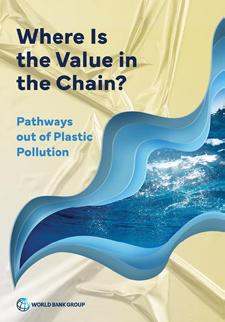 By Delphine Arri and Grzegorz Peszko
By Delphine Arri and Grzegorz Peszko
This report provides key recommendations to policymakers on how to create a comprehensive approach to addressing plastic pollution and make informed decisions.
August 2022. 144 pages. Stock no. C211881 (ISBN: 978-1-4648-1881-3). US$43.95
WOMEN, BUSINESS AND THE LAW 2022

By the World Bank Women, Business and the Law (WBL) is a World Bank Group project which measures the laws and regulations restricting women's economic opportunities. WBL informs research and policy discussions about the state of women's economic empowerment and emphasizes the work still to be done to ensure economic empowerment for all.
WOMEN, BUSINESS AND THE LAW
May 2022. 154 pages. Stock no. C211817 (ISBN: 978-1-4648-1817-2). US$43.95
27 phone +1 (703) 661 1580 • in the U.S. phone +1 (800) 645 7247 • fax +1 (703) 661 1501 WORLD BANK PUBLICATIONS WORLD BANK PUBLICATIONS BESTSELLERS
28 www.worldbank.org/publications • books@worldbank.org WORLD BANK PUBLICATIONS INDEX A Balancing Act for Brazil's Amazonian States 24 A Balancing Act for Brazil’s Amazonian States (Portuguese Edition) 24 Air Pollution and Climate Change ................................ 24 Bridging the Basic Learning Gap ................................... 9 Business of the State, State-Owned Enterprises, and Private Sector Development ......................................... 13 Catalyzing the Green Digital Transformation in Low- and Middle-Income Economies 16 Change Cannot Wait 17 Detox Development ....................................................... 4 Digital Africa (French Edition) ...................................... 10 Engendering Access to STEM Education and Careers in South Asia .................................................................... 23 Enhancing STEM Education and Careers in Sri Lanka ...................................................................... 24 Exports to Improve Labor Markets in the Middle East and North Africa 22 Falling Long-Term Growth Prospects 18 Global Economic Prospects, June 2023 ........................ 2 Informality and Inclusive Growth in the Middle East and North Africa .................................................................. 22 Innovative Korea .......................................................... 23 Investing in Reproductive and Child Health in Uganda ........................................................................ 24 Jobs for Development 3 Land Matters (French Edition) 11 Leveraging Trade for More and Better Jobs in Developing Countries 14 Migrants, Markets, and Mayors ....................................21 Misallocation of Firm Financing 15 Primer on Large-Scale Assessments of Educational Achievement (French Edition) ...................................... 19 Private Cities 13 Productivity through a Territorial Lens 7 Reality Check 16 Rising from the Depths 24 Silver Opportunity .........................................................18 Silver Opportunity Case Studies ...................................18 Skills Sector Transformation for Inclusion, Recovery, and Resilience in Sri Lanka ................................................. 25 Social Protection Program Spending and Household Welfare in Ghana 25 Striving for Clean Air 8 The Commons ...............................................................21 The Economics of Electric Vehicles for Passenger Transportation 6 The Economics of Water Scarcity in the Middle East and North Africa 12 The Effect of Multinational Enterprises on Climate Change ........................................................... 15 The Government Analytics Handbook 20 The Long Road to Inclusive Institutions in Libya 25 The Path to 5G in the Developing World 19 The Political Economy of Climate Action ....................... 17 Thriving .......................................................................... 5 Toolkit on Digital Entrepreneurial Ecosystem Diagnostics 25 Trade and Climate Change ........................................... 14 Working with Smallholders .......................................... 20 World Development Report 2023 ................................... 1
EUROPE, AFRICA, MIDDLE EAST & EAST ASIA, AUSTRALASIA
PRINCIPAL
Eurospan
WESTERN EUROPE
Sales Representative
MIDDLE EAST & NORTH AFRICA
EAST ASIA
REPUBLIC OF KOREA
BANGLADESH
Micro Industries Development
Assistance and Services (MIDAS)
DISTRIBUTOR
Gray’s Inn House
127 Clerkenwell Road, Lodon, EC1R 5DB United Kingdom info@eurospan.co.uk www.eurospan.co.uk
Trade Orders & Enquiries: Tel. +44 (0) 1235 465576 trade.orders@marston.co.uk
Individual Orders: www.eurospanbookstore.com /world-bank
EUROPE, UK & REPUBLIC OF IRELAND
Sales Representative
Phil Prestianni
Sales Manager, UK & Republic of Ireland
Eurospan phil.prestianni@eurospan .co.uk
Sales Agents and Booksellers
Dandy Booksellers
Tel. +44 (0) 2076242993 enquiries@dandybooksellers .com www.dandybooksellers.com
Dawson
Tel. +44 (0) 1933417500 nasser.lassoued@ dawsonbooks.co.uk www.dawsonbooks.co.uk
The Stationery Office Tel. +44 (0) 8706005522 customer.services@tso.co.uk www.tso.co.uk
NORDIC COUNTRIES
Sales Representative David Towle david@dti.a.se
Sales Agents and Booksellers
NORWAY
Akademika A/S
Tel. +47 (0) 22188100 kundeservice@akademika.no www.akademika.no
SWEDEN
Bokus
Tel. +46 (1) 07441047 elin.karlsson@bokus.com www.bokus.com
Michelle Zappa (Austria, Belgium, France, Germany, Italy, Luxembourg, Netherlands, Portugal, Spain, Switzerland)
michelle.zappa@ eurospan.co.uk
Sales Agents and Booksellers
BELGIUM
DL Services
Tel. +32 (0) 25384308
jean.de.lannoy@dl-servi.com www.jean-de-lannoy.be
GERMANY & AUSTRIA Massmann International Buchhandlung
Tel. +49 (4) 076700418 kay.massmann@massmann. de www.massmann.de
Missing Link Versandbuchhandlung
Tel. +49 (4) 21504348 info@missing-link.de www.missing-link.de
Planetis
Tel. +41 (0) 223665177 info@planetis.ch www.planetis.ch
ITALY
Casalini Libri s.p.a.
Tel. +39 (0) 5550181 orders@casalini.it www.casalini.it
PORTUGAL Omniserviços
Tel. +351 21 754 01 91 comercial@omniservicos.pt www.omniservicos.pt
SPAIN
Libreria Delsa
Tel. +914 (3) 57421 delsa@troa.es
Alibri Llibreria SL
Tel. +34 93 317 05 78
alibri@alibri.es www.alibri.es
SWITZERLAND
Planetis
Tel. +41 (0) 223665177
info@planetis.ch www.planetis.ch
EASTERN EUROPE
Sales Representative Jacek Lewinson
Tel. +48 502603290
jacek@jaceklewinson.com
Sales Representatives
International Publishers Representatives
Tel. +357 (0) 22872355 info@ipr-pub.com
Sales Agents and Booksellers
EGYPT
Middle East Readers’ Information Center (MERIC) Tel. +20 (2) 22681640 info@mericonline.com www.mericonline.com
MOROCCO
La Librairie Internationale
Tel. +212 (0) 5680329 Fax. +212 (0) 5770914 cclibinter@menara.ma
SUB-SAHARAN AFRICA
Sales Representative
Guy Simpson Africa Connection guy.simpson@ africaconnection.co.uk
Sales Agents and Booksellers
Mallory International Limited (UK)
Tel. +44 (0) 1395239199 julian@malloryint.co.uk www.malloryint.co.uk
NIGERIA
Citrax
Tel: +234 8022243515, info@citraxcompany.com
TANZANIA
Matthews Books and Stationery
Tel. +255 (0) 222861281 ipyanam@yahoo.com
SOUTHERN AFRICA
Sales Representative
Guy Simpson Africa Connection guy.simpson@ africaconnection.co.uk
Sales Agents and Booksellers
BOTSWANA
Botsalo Books
Tel. +267 (0) 3912576 botsalobooks@botsnet.bw
SOUTH AFRICA
Van Schaik Boekhandel
Tel. +27 (0) 219188437 vsorders@vanschaik.com www.vanschaik.com
PRINCIPAL DISTRIBUTOR
Korean Studies Information Co., Ltd. Tel. +82-31-940-1173 wb@kstudy.com http://wb.booktory.com
JAPAN
Far Eastern Booksellers
Tel : 81-3-3265-7532
Fax : 81-3-3265-4656 info@kyokuto-bk.co.jp www. kyokuto-bk.co.jp
Sales Agents and Booksellers
CHINA; HONG KONG, SAR, CHINA; TAIWAN, CHINA
China Publishers Marketing
Tel. +86 2154259557 benjamin.pan@cpmarketing .com.cn
BRUNEI, MALAYSIA, SINGAPORE
PMS Publishers Services Pte Ltd
Tel. +65 62565166 raymondlim@pms.com.sg
CAMBODIA, EAST TIMOR, INDONESIA, LAO PDR,, MYANMAR, PHILIPPINES, THAILAND, VIETNAM
Alkem Company (Singapore)
Pte Ltd
Tel. +65 62656666
Fax. +65 62617875 enquiry@alkem.com.sg
CENTRAL ASIA
AFGHANISTAN, AZERBAIJAN, KAZAKHSTAN, KYRGYZSTAN, TAJIKISTAN, TURKMENISTAN, UZBEKISTAN
Sales Representative
Marc Bedwell
Regional Manager, Asia-Pacific & Latin America
Eurospan
Tel. +44 (0) 2078450811
Fax. +44 (0) 2073790609 marc.bedwell@eurospan .co.uk
SOUTH ASIA
INDIA
PRINCIPAL DISTRIBUTOR
Viva Books Pvt Ltd
4737/23 Ansari Road
Daryaganj
New Delhi-110002
Tel: + 91-11- 42242200
Fax: + 91-11-42242240 vivadelhi@vivagroupindia.net
Tel: +880-2-8116094-5 midas@aitlbd.net
NEPAL
Everest Media International Services (P.) Ltd.
Tel: +977-1-4417048 emispltd@wlink.com.np
Bazaar
Tel: 977-1-4427098, sales@bazaarint.com
PAKISTAN
Pak Book Corporation
Tel: +92-42-6363222; 6360885 pbc@brain.net.pk
SRI LANKA
Marga Institute
Tel: 94-11-2888790/1 nfernando@margasrilanka .org
AUSTRALIA & NEW ZEALAND
Sales Agent and Bookseller Eurospan
C/o XL Express Logistics Tel: +61 (0) 2 8778 9999 orders.logistics@xlexpress .com.au
LATIN AMERICA AND THE CARIBBEAN
MEXICO
Valher Promociones y Representaciones
Tel: +52-55 5613 1293 valherpyr@prodigy.net.mx
TRINIDAD & TOBAGO AND THE CARIBBEAN Systematics Studies Ltd. Tel: +868-645-8466 systematicsssl@flowtrinidad .com
NORTH AMERICA
CANADA
Renouf Publishing Co. Ltd. Tel: +613-7452665 order.dept@renoufbooks.com www.renoufbooks.com
UNITED STATES (AND COUNTRIES NOT LISTED)
World Bank Publications
Tel: 1-800-6457247; 703-6611-580 Fax: +1-703-661-1501 books@worldbank.org
WORLD BANK PUBLICATIONS
III phone +1 (703) 661 1580 • in the U.S. phone +1 (800) 645 7247 • fax +1 (703) 661 1501 WORLD BANK PUBLICATIONS DISTRIBUTORS
openknowledge.worldbank.org bit.ly/wbgpublications facebook.com/worldbankpublications twitter.com/wbpubs bit.ly/wbpubyoutube VIE W CATALOG worldbank.org/publications WORLD BANK GROUP Publications & eProducts Stock no. 33616 1818 H St. NW, Washington, DC 20433, USA







 By the World Bank
By the World Bank










 By Mariem Malouche, Birgit Hansl, and Mary C. Hallward-Driemeier
By Mariem Malouche, Birgit Hansl, and Mary C. Hallward-Driemeier

 By Maryla Maliszewska and Deborah Winkler
By Maryla Maliszewska and Deborah Winkler

 By Victor Steenbergen and Abhishek Saurav
By Victor Steenbergen and Abhishek Saurav
 By Tatiana Didier and Ana Paula Cusolito
By Tatiana Didier and Ana Paula Cusolito
 By the World Bank
By the World Bank

 By Stephane Hallegatte, Paolo Avner, Ira Dorband, Catrina Godinho, Dirk Heine, Penelope Mealy, and Jun Rentschler
By Stephane Hallegatte, Paolo Avner, Ira Dorband, Catrina Godinho, Dirk Heine, Penelope Mealy, and Jun Rentschler
 By Sulzhan Bali, Zara Shubber, and Feng Zhao
By Sulzhan Bali, Zara Shubber, and Feng Zhao
 By Xiaohui Hou, Jigyasa Sharma, and Feng Zhao
By Xiaohui Hou, Jigyasa Sharma, and Feng Zhao
 Edited by M. Ayhan Kose and Franziska Ohnsorge
Edited by M. Ayhan Kose and Franziska Ohnsorge















 By Shobhana Sosale, Graham Mark Harrison, Namrata Tognatta, Shiro Nakata, and Priyal Mukesh Gala
By Shobhana Sosale, Graham Mark Harrison, Namrata Tognatta, Shiro Nakata, and Priyal Mukesh Gala


















 By Shahidur R. Khandker, Gayatri B. Koolwal, and Hussain A. Samad
By Shahidur R. Khandker, Gayatri B. Koolwal, and Hussain A. Samad
 Edited by Paul Glewwe and Petra Todd
Edited by Paul Glewwe and Petra Todd
 Edited by Maria Magdalena Bendini and Amanda Devercelli
Edited by Maria Magdalena Bendini and Amanda Devercelli

 By Paul J. Gertler, Sebastian Martinez, Patrick Premand, Laura B. Rawlings, and Christel M. J. Vermeersch
By Paul J. Gertler, Sebastian Martinez, Patrick Premand, Laura B. Rawlings, and Christel M. J. Vermeersch


 By Delphine Arri and Grzegorz Peszko
By Delphine Arri and Grzegorz Peszko
























